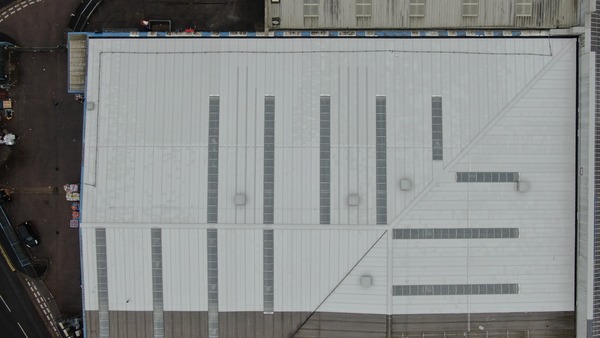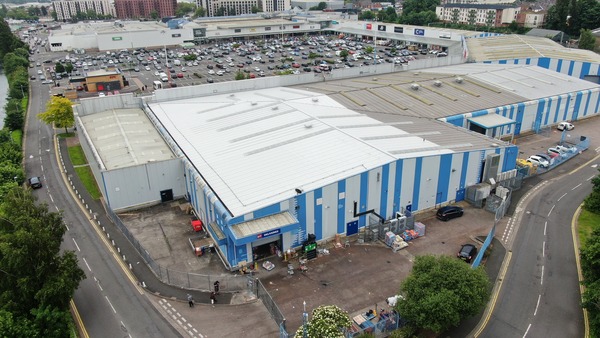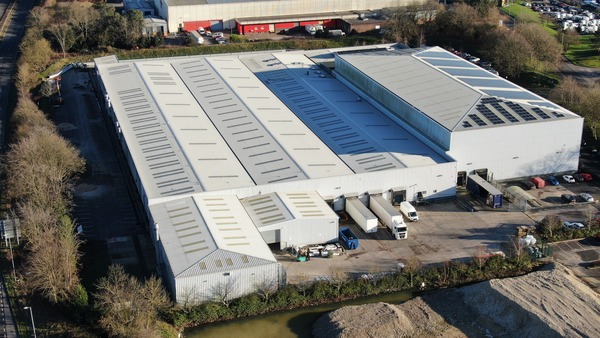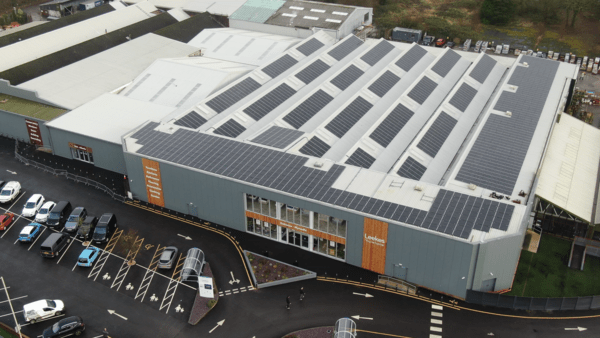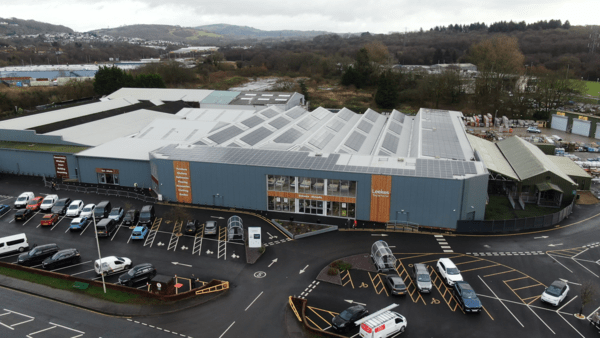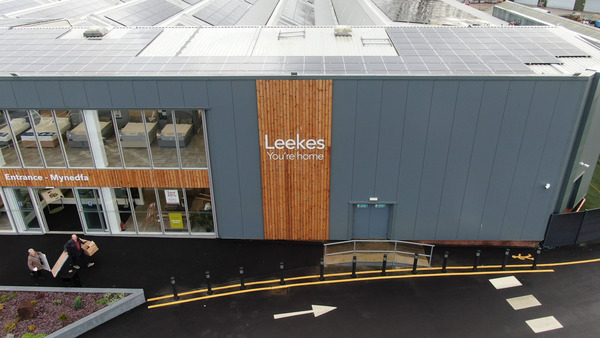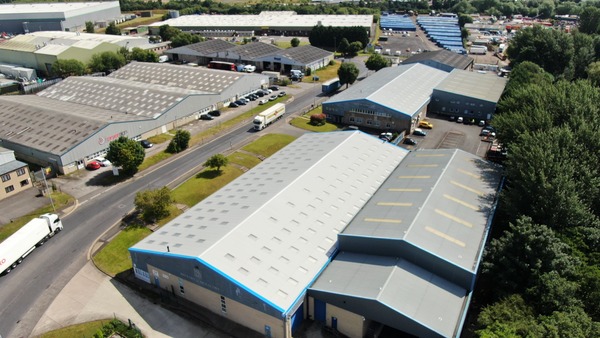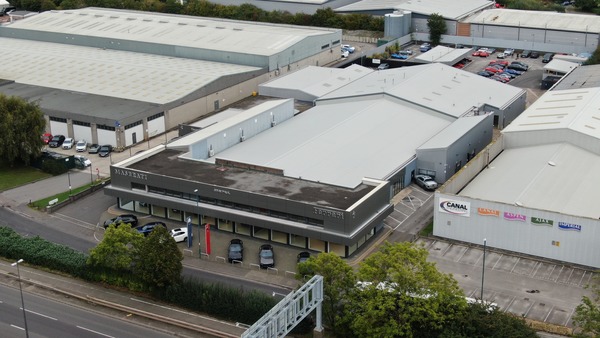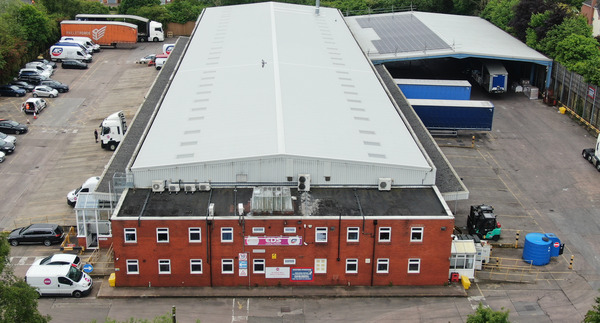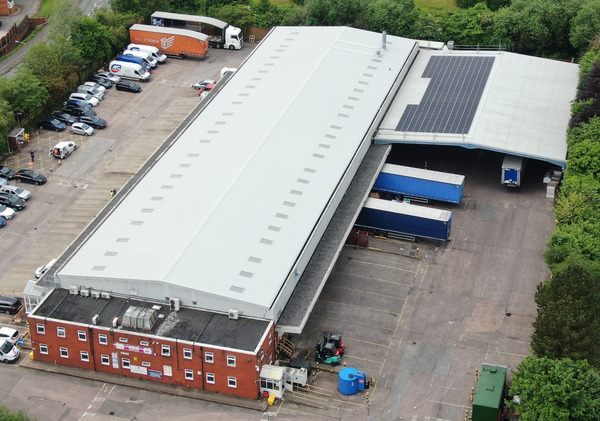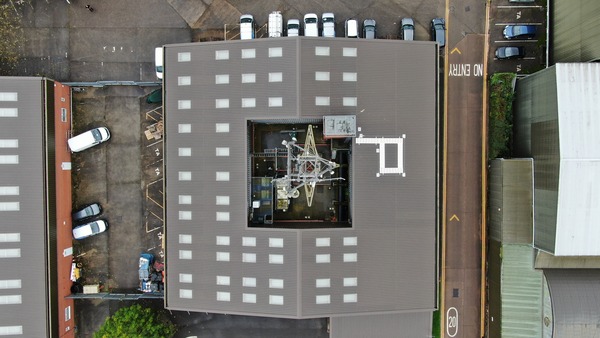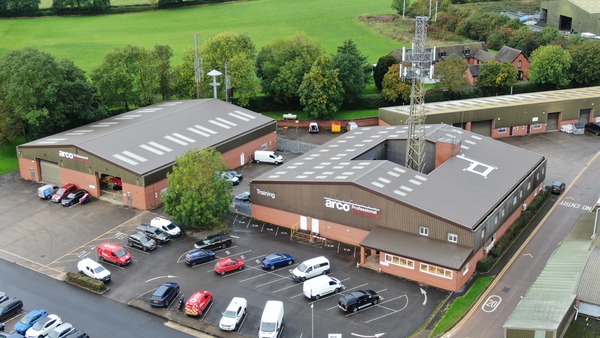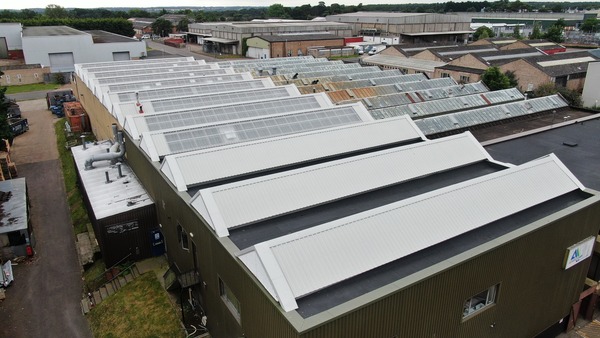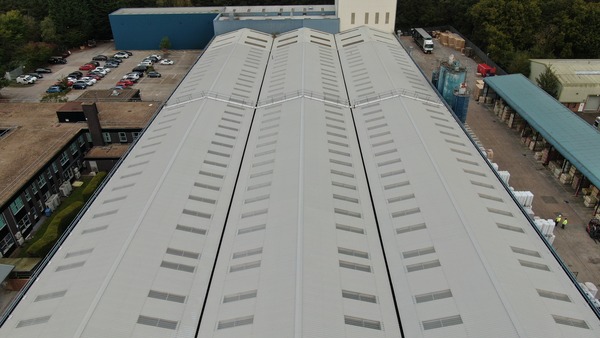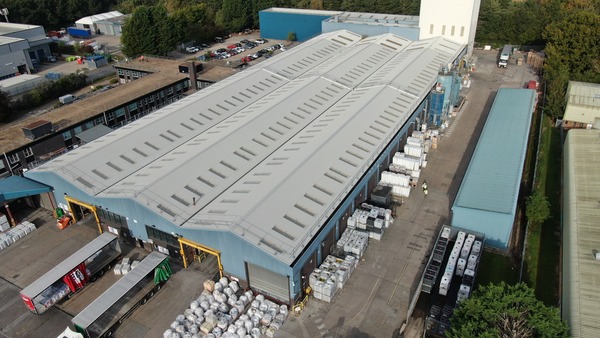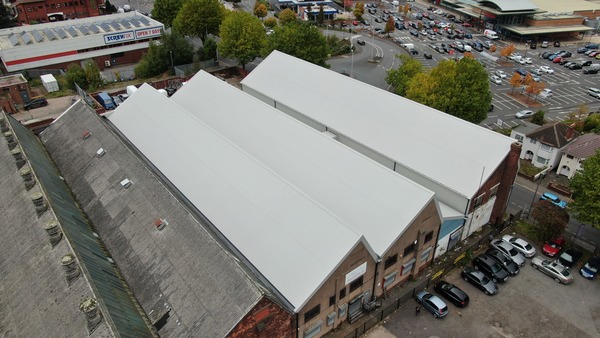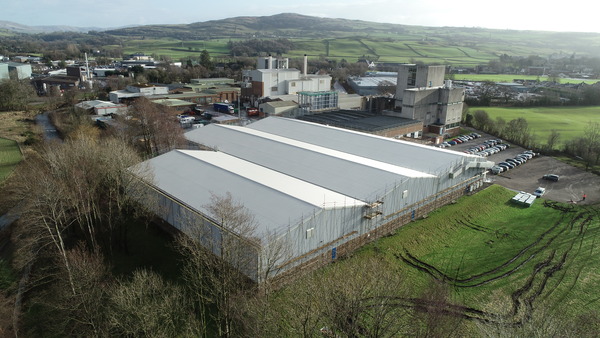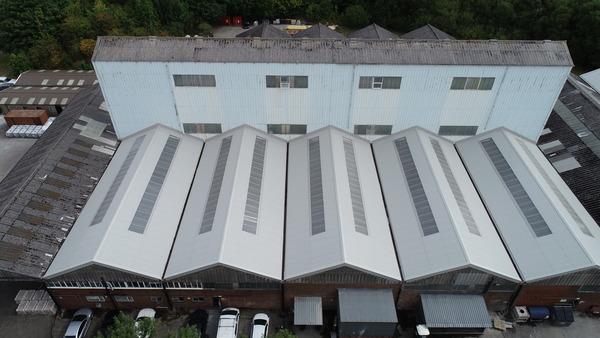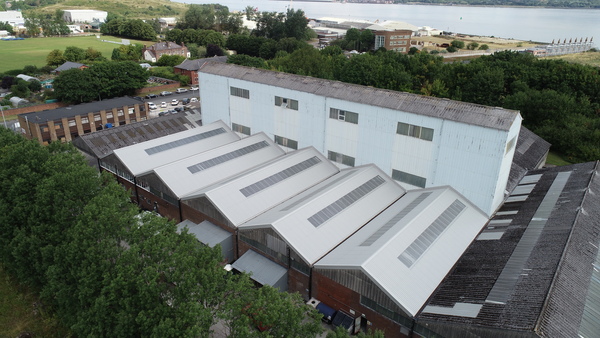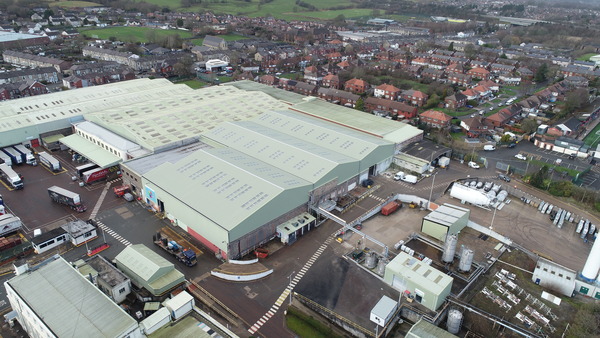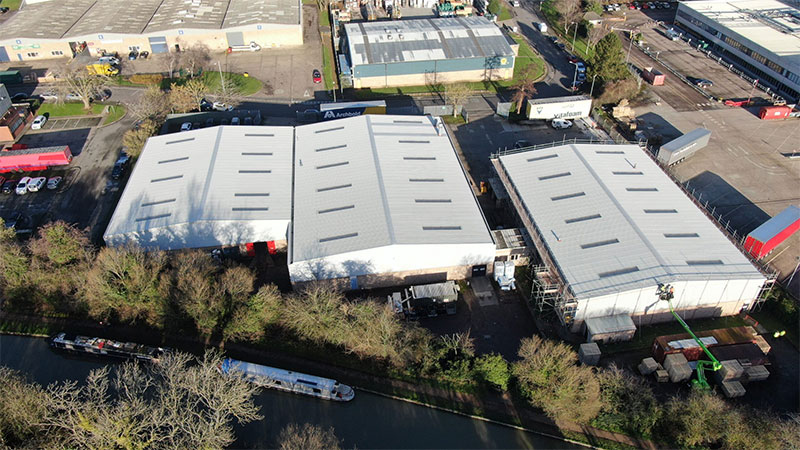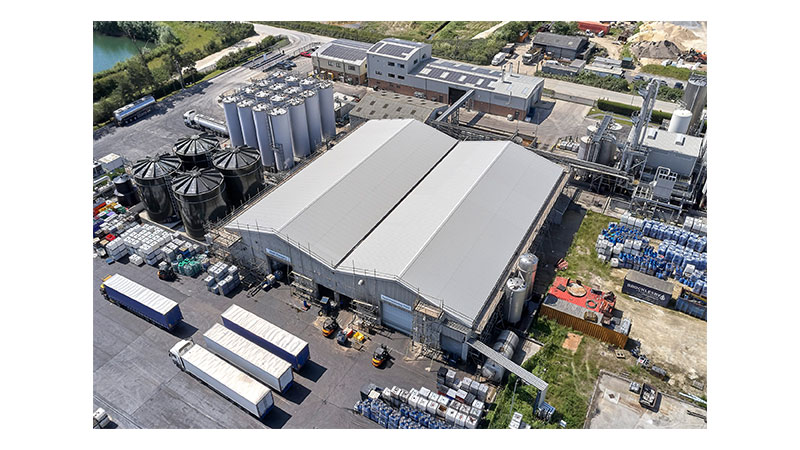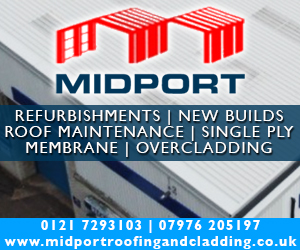Telephone
Click to view
Contact
Friendly Sales Team
Email
Address
UNIT 50 Britannia Way
Britannia Enterprise Park
Britannia Enterprise Park
LICHFIELD
WS14 9UY
Opening Hours
Today
Closed
View All Hours
Sunday
Closed
Monday
08:30-05:00
Tuesday
08:30-05:00
Wednesday
08:30-05:00
Thursday
08:30-05:00
Friday
08:30-05:00
Saturday
Closed
About Profile Industrial Roofing Services Ltd
Established in 1996, Profile Industrial Roofing has built a solid reputation as market leaders in the provision of industrial and commercial roof refurbishment solutions.
STRIP & RE-SHEET
When your industrial roofing needs replacing, we’re ready to help. We supply a range of single skin, double skin, and composite panels, selected from leading manufacturers to suit your requirements and budget.
Our technical surveyor and roofing team will design and install a complete new roof efficiently and safely. Your personal project manager will be by your side from the start with regular client meetings, a comprehensive understanding of your options and a plan of works that ensures minimal impact on your business hours. We arrange every aspect of your project including inspections and waste removal.
ASBESTOS ROOF REPLACEMENT.
Identifying chrysotile, also known as ‘white’ asbestos, is a challenging task.
Visual inspection alone is insufficient to determine if roof sheeting contains asbestos. To ensure accurate identification, it’s essential to seek professional services.
With years of experience in safe chrysotile asbestos removal, our specialist team is trained and accredited by ARCA (Asbestos Removal Contractors Association).
OVER-CLADDING / ENCAPSULATION.
When you need a fast and cost-effective solution to your ageing or damaged industrial roof, over-cladding or encapsulation may be an option. Both methods offer significant advantages in terms of cost, efficiency and minimal disruption to your operations. By understanding the unique benefits and processes involved in each option, you can make an informed decision that ensures the longevity and functionality of your industrial roof.
WALL CLADDING.
Make your business stand out with a fresh new look and improve your EPC ratings at the same time. Exterior wall cladding panels are available in a variety of colours, styles and materials. You can choose to style your building to suit your surroundings, display your brand colours or create an eye-catching aesthetic. But it’s not all about appearances.
FELTING & WATERPROOFING
When your industrial roofing needs immediate care and attention, we are experts in identifying the best solution to stop water ingress. If you have a felt roof letting the leaks through, we can help repair or replace your felting quickly and efficiently, ensuring your building remains dry and secure.
ROOFLIGHT SOLUTIONS.
When you decide to renovate or replace your industrial roof, consider the advantages of adding some glass-reinforced plastic (GRP) rooflights. These simple additions allow plenty of natural lighting into your building, effectively transforming dark interiors.
Natural lighting brings several benefits to your business. You’ll use less artificial lighting, which reduces your energy bills and carbon footprint. Increased natural lighting creates a more welcoming and enjoyable work environment and has been shown to have a positive impact on employee well-being, improving mental health and productivity in your workforce. Plus, a brighter interior will create a more modern workspace, which can help attract new talent.
GUTTERING SYSTEMS.
As every facilities manager knows, regular inspections of your industrial roofing and guttering systems are vital, especially after heavy downpours. Gutters accumulate leaves, moss, debris and silt throughout the year, especially during autumn and winter months, and without regular cleaning they can easily become blocked.
Profile Industrial Roofing Services Ltd.
5
out of 5
based on 18 ratings.
Reviews & Testimonials for Profile Industrial Roofing Services Ltd

“Profile Industrial Roofing have been a great company to work with, installing our roof in the challenging weather conditions of the English Lake District. The team installed the roof system without any issues making our reroof project a success. Highly recommended.”
Grant Remington, Kendal Nutricare, Projects & Contracts Manager
Grant Remington, Kendal Nutricare, Projects & Contracts Manager
August 30, 2024
Review by
Mathew Oliver
Review by
Mathew Oliver

“Profile worked with our team to ensure minimal disruption to our site operations, the project was a great success. I wouldn’t hesitate to recommend them in the future.”
Lynne Barnett, Harbison Walker, Operations Manager
Lynne Barnett, Harbison Walker, Operations Manager
August 30, 2024
Review by
Mathew Oliver
Review by
Mathew Oliver

"I am thrilled with the outstanding service I received from Profile Industrial Roofing. The attention to detail and prompt communication truly set them apart. From the initial inspection to the completion of the project, every step was executed with professionalism. I would recommend Profile Industrial Roofing to anyone seeking a reliable and high-quality contractor for their roofing needs."
Nick Jessop, Head of Business, Graypaul Nottingham
Nick Jessop, Head of Business, Graypaul Nottingham
August 30, 2024
Review by
Mathew Oliver
Review by
Mathew Oliver

“Working with Profile Industrial Roofing has been a positive experience. Their expertise in installing our roof in a busy city centre location was impressive. The teams commitment to delivering high-quality workmanship was evident throughout the project and we are delighted with the results.”
Mathew Oliver, Managing Director, European Mezzanine Systems
Mathew Oliver, Managing Director, European Mezzanine Systems
August 30, 2024
Review by
Mathew Oliver
Review by
Mathew Oliver

“We sought a roofing partner who could meet our needs with minimal disruption to our business. Profile Industrial Roofing proved to be the perfect contractor. Their team delivered an efficient, high-quality service while ensuring our daily operations continued smoothly.”
Scott Taylor, LWC Drinks
Scott Taylor, LWC Drinks
June 19, 2024
Testimonial by
LWC Drinks
Testimonial by
LWC Drinks

“I'd like to thank Profile Industrial Roofing for their outstanding work on our roofing project. Their team executed the refurbishment with professionalism, ensuring quality and safety throughout. They exceeded our expectations. I would certainly recommend Profile Industrial Roofing to any business seeking reliable roofing solutions.”
Chris Boughey, Contracts Manager, Reirse Ryan Limited
Chris Boughey, Contracts Manager, Reirse Ryan Limited
June 17, 2024
Testimonial by
Reirse Ryan Limited
Testimonial by
Reirse Ryan Limited

“From start to finish Profile has completed exceptional and professional work, all communication was excellent, especially with Donna who always had time to discuss options in a friendly and professional manner. On site Albert communicated well and easily explained the ‘roofing professional’ terms in layman’s terms for me. 5 stars all round, thank you.”
Greg Warwick, Reginox, logistics and operations manager
Greg Warwick, Reginox, logistics and operations manager
May 22, 2024
Testimonial by
Reginox
Testimonial by
Reginox

"We are delighted with the outstanding service and quality delivered by Profile Industrial Roofing. Their attention to detail and commitment to excellence surpassed our expectations. Choosing Profile Industrial Roofing was undoubtedly the right decision, and we now have complete confidence in the reliability of our commercial roof."
Ian Edmondson, Facilities Manager, Arco ltd
Ian Edmondson, Facilities Manager, Arco ltd
April 10, 2024
Testimonial by
Arco Professional Safety Services
Testimonial by
Arco Professional Safety Services

“During our Head Office facility upgrade, finding a reliable roofing contractor was crucial for the success of our project. We chose Profile Industrial Roofing for their reputation, trustworthiness and competitive pricing. We are grateful for their expertise and commitment to excellence which despite mother nature trying her best to derail and delay the project was completed in a timely manner and to an excellent standard.”
Martin Howard, Head of Property, Neptune (Europe) Ltd
Martin Howard, Head of Property, Neptune (Europe) Ltd
March 19, 2024
Testimonial by
Neptune (Europe) Ltd
Testimonial by
Neptune (Europe) Ltd

“Profile Industrial Roofing's performance ensured that it was business as usual for our visiting customers throughout the project, reflecting their commitment to excellence and customer satisfaction. The completed works exceeded our expectations and we are delighted with the final outcome.”
Gareth Skeet, Group Buildings Manager, Leekes
Gareth Skeet, Group Buildings Manager, Leekes
March 13, 2024
Testimonial by
Leekes
Testimonial by
Leekes

“Profile undertook the complete warehouse roof replacement project for Weber covering over 6000m² and have completed with exceptional results. Dave and the whole team from Profile have done a fantastic job running this project and excelled with their customer service, safety management and professionalism over the past 7 months onsite. I would have no problem recommending them or inviting them to undertake more work for us here at Weber Flitwick. Great job everyone –Thank you.”
Kevin Medhurst, Engineering Manager, Saint-Gobain Weber
Kevin Medhurst, Engineering Manager, Saint-Gobain Weber
February 02, 2024
Testimonial by
Saint-Gobain Weber
Testimonial by
Saint-Gobain Weber

"I am thrilled with the outstanding service I received from Profile Industrial Roofing. The attention to detail and prompt communication truly set them apart. From the initial inspection to the completion of the project, every step was executed with professionalism. I would recommend Profile Industrial Roofing to anyone seeking a reliable and high-quality contractor for their roofing needs."
Nick Jessop, Head of Business, Graypaul Nottingham
Nick Jessop, Head of Business, Graypaul Nottingham
January 16, 2024
Testimonial by
Graypaul Nottingham
Testimonial by
Graypaul Nottingham

“Working with Profile Industrial Roofing has been a positive experience. Their expertise in installing our roof in a busy city centre location was impressive. The team's commitment to delivering high-quality workmanship was evident throughout the project and we are delighted with the results.”
Mathew Oliver, Managing Director, European Mezzanine Systems
Mathew Oliver, Managing Director, European Mezzanine Systems
January 02, 2024
Testimonial by
European Mezzanine Systems
Testimonial by
European Mezzanine Systems

"The professionalism and expertise demonstrated by the Profile Industrial Roofing team exceeded our expectations. The seamless coordination to the project ensured that our operations faced minimal disruption. We couldn't be more pleased with the roof installation.”
Charlie Lowe, Turner Bianca
Charlie Lowe, Turner Bianca
December 08, 2023
Testimonial by
Turner Bianca
Testimonial by
Turner Bianca

“Workers onsite were professional, polite and adhered to all Health and Safety procedures, they are an asset to the company.”
Vivien Gebbie, Site Manager, Vita Cellular Foams (UK) Ltd
Vivien Gebbie, Site Manager, Vita Cellular Foams (UK) Ltd
October 24, 2023
Testimonial by
Vita Cellular Foams (UK) Ltd
Testimonial by
Vita Cellular Foams (UK) Ltd

“Profile have been an excellent contractor and we have been delighted with their craftsmanship and installation of the new roof. We would highly recommend them.”
Steve Wrighton, Crown Paints, European Indirect Procurement Director
Steve Wrighton, Crown Paints, European Indirect Procurement Director
October 17, 2023
Testimonial by
Crown Paints
Testimonial by
Crown Paints

“Profile worked with our team to ensure minimal disruption to our site operations, the project was a great success. I wouldn’t hesitate to recommend them in the future.”
Lynne Barnett, Harbison Walker, Operations Manager
Lynne Barnett, Harbison Walker, Operations Manager
October 17, 2023
Testimonial by
Harbison Walker
Testimonial by
Harbison Walker

“Profile Industrial Roofing have been a great company to work with, installing our roof in the challenging weather conditions of the English Lake District. The team installed the roof system without any issues making our reroof project a success. Highly recommended.”
Grant Remington, Kendal Nutricare, Projects & Contracts Manager
Grant Remington, Kendal Nutricare, Projects & Contracts Manager
October 17, 2023
Testimonial by
Kendal Nutricare
Testimonial by
Kendal Nutricare
Gallery
Videos
News
We are thrilled to announce that Profile Industrial Roofing has earned the prestigious Constructionline Gold accreditation! This achievement underscores our steadfast commitment to health, safety and operational excellence within the construction industry.
Constructionline Gold is a recognised accreditation within the UK construction industry, designed to demonstrate that a company meets high standards in various aspects of its operations. It’s part of the Constructionline certification scheme, which provides a platform for buyers and suppliers to streamline the pre-qualification process for construction projects.
Anna Sanders, Profile Industrial Roofing, Business Development Manager, said: "Achieving Constructionline Gold is testament to our unwavering commitment to safety and excellence. It's a standard we build upon, ensuring every project is successful and every client partnership is strong."
In addition to this significant accolade, we proudly hold several other industry-leading certifications, including BSI ISO 9001, CHAS, Constructionline Acclaim, Alcumus SafeContractor, and SafePQQ. Each of these reflects our relentless pursuit of quality and safety in every aspect of our work.
Constructionline Gold is a recognised accreditation within the UK construction industry, designed to demonstrate that a company meets high standards in various aspects of its operations. It’s part of the Constructionline certification scheme, which provides a platform for buyers and suppliers to streamline the pre-qualification process for construction projects.
Anna Sanders, Profile Industrial Roofing, Business Development Manager, said: "Achieving Constructionline Gold is testament to our unwavering commitment to safety and excellence. It's a standard we build upon, ensuring every project is successful and every client partnership is strong."
In addition to this significant accolade, we proudly hold several other industry-leading certifications, including BSI ISO 9001, CHAS, Constructionline Acclaim, Alcumus SafeContractor, and SafePQQ. Each of these reflects our relentless pursuit of quality and safety in every aspect of our work.
When you’re trying to choose the right industrial roofing company, you want to know more about us than just the quote. We have over 25 years of experience providing roofing for industrial and commercial companies, working alongside your management team to adjust the schedule of work around your business.
We also take care of the health and safety impact of the site for both our team and your employees. In fact, we are very proud of our safety record. Here’s just a brief glance at some of the more common things we consider.
Working at height – H&S on your roofing
One of the key pieces of health and safety legislation we comply with is working at height. All of our employees have completed rooftop safety courses. We employ the use of scaffolding, harnesses and other measures to keep our team safe, and consider things such as walking on wet panels, slip hazards and the potential weaknesses of old, damaged roofing panels.
There can be serious consequences if we drop tools or materials from height. That’s why hard hats matter in construction environments. We use netting or other safety measures to stop anything dropping onto your expensive machinery.
No roof is straightforward. We often encounter roofs that are unusually shaped, have obstructions to work around or are not accessible by scaffolding. There is always a way around, so we look for alternate safety solutions.
Operating plant in a construction environment
As part of the planning to replace your industrial roofing, we inform you of large plant equipment we bring on to site. Our team will have telehandler and forklift truck licenses. We may also use MEWP (mobile elevated work platforms) and cherry pickers. We always have the right equipment for the job – and our team are licensed and qualified to use them.
Health and safety around plant doesn’t just mean looking after large machinery. We use power and hand tools, which are regularly checked. Even when in proper working order there can be personal risk to health from long-term exposure to hand-arm vibrations.
The danger of hazardous substances in roofing
Roofers handle chemicals and hazardous substances other than asbestos, such as mastic sealant. Our felting process includes torch-applied and roll-and-pour bitumen felting, which involves handling very hot substances or gas-powered flames. Cold liquid waterproofing contains reactive chemicals.
Using hazardous substances has serious potential health risks to our team, such as dangers to skin or respiratory ailments. Everyone wears the correct safety equipment and workwear. And we also consider the work environment, including wind speeds and the potential of gusts blowing liquids onto workers or people below.
Working environment and services on industrial roofing
There’s one more hazard to consider on a rooftop – and that’s what’s going on over our heads. We always perform a full site inspection before starting work. We check for overhead cables, as well as any services that are under the existing roof panel which remain the client’s responsibility. We will discuss all of your obligations during the planning phase. Preparation is a key part of the health and safety process.
Health and Safety Accreditations
If this all sounds very daunting, don’t worry. As we said, we are proud of our safety record on site. We proactively train our workforce to cover all aspects of health and safety and hold Safe Contractor, CHAS and Constructionline Gold accreditations.
When you’re trying to choose the right industrial roofing company, it’s not just about the price. Ask about our health and safety record, and you’ll see that the safety of your team and ours is our top priority. If you’d like to know more and discuss concerns about your roof refurbishment, call us today on 01543 411855.
We also take care of the health and safety impact of the site for both our team and your employees. In fact, we are very proud of our safety record. Here’s just a brief glance at some of the more common things we consider.
Working at height – H&S on your roofing
One of the key pieces of health and safety legislation we comply with is working at height. All of our employees have completed rooftop safety courses. We employ the use of scaffolding, harnesses and other measures to keep our team safe, and consider things such as walking on wet panels, slip hazards and the potential weaknesses of old, damaged roofing panels.
There can be serious consequences if we drop tools or materials from height. That’s why hard hats matter in construction environments. We use netting or other safety measures to stop anything dropping onto your expensive machinery.
No roof is straightforward. We often encounter roofs that are unusually shaped, have obstructions to work around or are not accessible by scaffolding. There is always a way around, so we look for alternate safety solutions.
Operating plant in a construction environment
As part of the planning to replace your industrial roofing, we inform you of large plant equipment we bring on to site. Our team will have telehandler and forklift truck licenses. We may also use MEWP (mobile elevated work platforms) and cherry pickers. We always have the right equipment for the job – and our team are licensed and qualified to use them.
Health and safety around plant doesn’t just mean looking after large machinery. We use power and hand tools, which are regularly checked. Even when in proper working order there can be personal risk to health from long-term exposure to hand-arm vibrations.
The danger of hazardous substances in roofing
Roofers handle chemicals and hazardous substances other than asbestos, such as mastic sealant. Our felting process includes torch-applied and roll-and-pour bitumen felting, which involves handling very hot substances or gas-powered flames. Cold liquid waterproofing contains reactive chemicals.
Using hazardous substances has serious potential health risks to our team, such as dangers to skin or respiratory ailments. Everyone wears the correct safety equipment and workwear. And we also consider the work environment, including wind speeds and the potential of gusts blowing liquids onto workers or people below.
Working environment and services on industrial roofing
There’s one more hazard to consider on a rooftop – and that’s what’s going on over our heads. We always perform a full site inspection before starting work. We check for overhead cables, as well as any services that are under the existing roof panel which remain the client’s responsibility. We will discuss all of your obligations during the planning phase. Preparation is a key part of the health and safety process.
Health and Safety Accreditations
If this all sounds very daunting, don’t worry. As we said, we are proud of our safety record on site. We proactively train our workforce to cover all aspects of health and safety and hold Safe Contractor, CHAS and Constructionline Gold accreditations.
When you’re trying to choose the right industrial roofing company, it’s not just about the price. Ask about our health and safety record, and you’ll see that the safety of your team and ours is our top priority. If you’d like to know more and discuss concerns about your roof refurbishment, call us today on 01543 411855.
Businesses choose to adopt more eco-friendly practices for various reasons, including aligning with core values, responding to consumer interest and achieving ambitious targets for net zero emissions by 2050. Regardless of the reason for becoming more environmentally conscious, facilities managers should consider exploring sustainable roofing solutions to contribute towards energy efficiency.
The UK Government has proposed that companies across the UK that reduce their energy consumption by 20% could save up to £6 billion by 2030.
Here are 5 eco-friendly options to consider for your next commercial roof.
1. Solar panels
Utilising the space on a commercial roof for solar panels is the perfect solution to offset a building’s electricity usage. Solar panels last for up to 25 years so it is important to get your commercial roof inspected by a specialist roofing contractor to ensure its condition and structural integrity will maximise the lifespan of your solar panel system.
2. Recycled materials
An effective way to minimise the environmental impact of a new roof is to use roofing materials made from recycled content. Recycled metal, rubber and plastics help reduce the need for new raw materials and divert waste away from landfill sites.
3. Green roofing systems
Green roofs incorporate living vegetation such as plants, grass, or other greenery. Not only are they aesthetically pleasing to staff, but they also provide benefits like energy efficiency through natural insulation, enhanced biodiversity and improved air quality.
4. White roofing systems
Roofs that have a light-coloured membrane, known as cool roofs, efficiently reflect sunlight and absorb less heat compared to traditional roofing materials. By adopting a cool roof, buildings can experience lower temperatures inside, reducing the need for air conditioning in the summer months. This approach can result in lower electricity bills and offer employees a more comfortable environment.
5. Metal roofing systems
There are several reasons why a metal roof is an environmentally friendly choice for a commercial building. It is recyclable, contributing to the reduction of waste to landfills. Furthermore, metal roofs are long-lasting, meaning fewer replacements over the lifespan of the structure. It is also reflective, keeping buildings cool during the warmer months.
When considering investing in sustainable commercial roofing options, appointing a specialist contractor is an important step in making your building more environmentally friendly. They will have the expertise and knowledge in sustainable roofing practices, energy-efficient systems, use of recycled materials, waste reduction strategies and commitment to green accreditations.
Choosing the right contractor
At Profile Industrial Roofing, we’ve got over 25 years of hands-on experience in managing projects from survey through to completion. We rigorously vet our suppliers to ensure they are actively working towards net-zero emissions and are committed to investing in environmental best practices. Our fully trained and experienced sales professionals can assess your roof and recommend the best course of action to take.
For example, we recently replaced a roof for Turner Bianca in Oldham. Following a site survey by our technical surveyor, it was decided the best solution was a fully built-up flat roofing (BUR) system. The flat roof was designed to be solar-ready, allowing Turner Bianca to easily integrate solar panels in the future.
The project involved the clean-off and preparation of the roof area. Then we installed a Sopratherm G 50 mm power deck thermal insulation boarding, further enhancing energy efficiency.
A bituminous primer, followed by a layer of Polyglass 3kg torch on polyester glass fibre, topped off by a Polyglass 4.5kg SBS Polyester green mineral roofing felt was applied to achieve a waterproof and durable finish.
To learn more about Profile Industrial Roofing and how we can help with your roof refurbishment project, please call the team on 01543 411855.
The UK Government has proposed that companies across the UK that reduce their energy consumption by 20% could save up to £6 billion by 2030.
Here are 5 eco-friendly options to consider for your next commercial roof.
1. Solar panels
Utilising the space on a commercial roof for solar panels is the perfect solution to offset a building’s electricity usage. Solar panels last for up to 25 years so it is important to get your commercial roof inspected by a specialist roofing contractor to ensure its condition and structural integrity will maximise the lifespan of your solar panel system.
2. Recycled materials
An effective way to minimise the environmental impact of a new roof is to use roofing materials made from recycled content. Recycled metal, rubber and plastics help reduce the need for new raw materials and divert waste away from landfill sites.
3. Green roofing systems
Green roofs incorporate living vegetation such as plants, grass, or other greenery. Not only are they aesthetically pleasing to staff, but they also provide benefits like energy efficiency through natural insulation, enhanced biodiversity and improved air quality.
4. White roofing systems
Roofs that have a light-coloured membrane, known as cool roofs, efficiently reflect sunlight and absorb less heat compared to traditional roofing materials. By adopting a cool roof, buildings can experience lower temperatures inside, reducing the need for air conditioning in the summer months. This approach can result in lower electricity bills and offer employees a more comfortable environment.
5. Metal roofing systems
There are several reasons why a metal roof is an environmentally friendly choice for a commercial building. It is recyclable, contributing to the reduction of waste to landfills. Furthermore, metal roofs are long-lasting, meaning fewer replacements over the lifespan of the structure. It is also reflective, keeping buildings cool during the warmer months.
When considering investing in sustainable commercial roofing options, appointing a specialist contractor is an important step in making your building more environmentally friendly. They will have the expertise and knowledge in sustainable roofing practices, energy-efficient systems, use of recycled materials, waste reduction strategies and commitment to green accreditations.
Choosing the right contractor
At Profile Industrial Roofing, we’ve got over 25 years of hands-on experience in managing projects from survey through to completion. We rigorously vet our suppliers to ensure they are actively working towards net-zero emissions and are committed to investing in environmental best practices. Our fully trained and experienced sales professionals can assess your roof and recommend the best course of action to take.
For example, we recently replaced a roof for Turner Bianca in Oldham. Following a site survey by our technical surveyor, it was decided the best solution was a fully built-up flat roofing (BUR) system. The flat roof was designed to be solar-ready, allowing Turner Bianca to easily integrate solar panels in the future.
The project involved the clean-off and preparation of the roof area. Then we installed a Sopratherm G 50 mm power deck thermal insulation boarding, further enhancing energy efficiency.
A bituminous primer, followed by a layer of Polyglass 3kg torch on polyester glass fibre, topped off by a Polyglass 4.5kg SBS Polyester green mineral roofing felt was applied to achieve a waterproof and durable finish.
To learn more about Profile Industrial Roofing and how we can help with your roof refurbishment project, please call the team on 01543 411855.
Profile Industrial Roofing utilises drone technology as part of its industrial roof inspection process. This approach enhances safety, speed and accuracy in roof assessments.
The benefits of drone commercial roof surveys:
• Cost-effective: Drones can quickly survey large areas, reducing the time and labour costs associated with traditional methods.
• High-resolution imaging: Equipped with advanced cameras, drones provide detailed images and videos, allowing for precise analysis of roof conditions.
• Safety: Drones eliminate the need for surveyors to climb onto factory roofs, reducing the risk of falls and accidents.
• Access to difficult areas: Drones can easily access hard-to-reach areas, such as steep or complex roof structures, without the need for scaffolding or ladders.
• Reduced equipment costs: Drones eliminate the need for expensive machinery rentals or purchases.
Our commitment to adopting advanced technology highlights our dedication to providing a first-class service to our clients.
Do you have a roofing project coming up, if so, please call the team on 01543 411855 to arrange a drone survey.
The benefits of drone commercial roof surveys:
• Cost-effective: Drones can quickly survey large areas, reducing the time and labour costs associated with traditional methods.
• High-resolution imaging: Equipped with advanced cameras, drones provide detailed images and videos, allowing for precise analysis of roof conditions.
• Safety: Drones eliminate the need for surveyors to climb onto factory roofs, reducing the risk of falls and accidents.
• Access to difficult areas: Drones can easily access hard-to-reach areas, such as steep or complex roof structures, without the need for scaffolding or ladders.
• Reduced equipment costs: Drones eliminate the need for expensive machinery rentals or purchases.
Our commitment to adopting advanced technology highlights our dedication to providing a first-class service to our clients.
Do you have a roofing project coming up, if so, please call the team on 01543 411855 to arrange a drone survey.
Is your commercial building struggling with a deteriorating roof, signalling the need for a significant investment?
When the integrity of your commercial roof starts to fail, the effects go beyond structural issues. Your roof plays an important role in protecting the wellbeing of employees, the smooth operation of expensive machinery and the safety of valuable stock against the elements. Despite meticulous care and attention, every building will eventually require a roof replacement.
We offer a solution that not only prolongs the life of your roof but does so cost-effectively and efficiently – roof over cladding / encapsulation.
What is commercial roof over cladding?
Roof over cladding is the process that involves adding a frame over the existing roof, followed by a thermal insulator and new panels.
Here are some potential benefits of over cladding a commercial roof:
• Cost-effective: Over cladding is often a more cost-effective option compared to a complete roof replacement. It allows building owners to upgrade the roof without the extensive costs and disruption associated with stripping off the existing roof.
• Energy efficiency: Over cladding offers the chance to improve insulation and energy efficiency, as the process allows for the upgrading of insulation materials, leading to reduced energy bills.
• Minimal disruption: Unlike a full roof replacement, over cladding minimises disruption to business operations, as the installation process is typically faster and less intrusive. This can be especially important for businesses that need to continue operations during the roofing project.
• Improved weather resistance: Commercial roofs are constantly exposed to harsh weather conditions, including rain, snow, wind and UV radiation. Over cladding provides an additional layer of protection, safeguarding the building against water ingress and other weather-related damage.
• Aesthetically pleasing: This approach not only offers a chance to refresh the building's appearance but also introduces the versatility of new cladding materials, which come in an array of styles and colours, enabling aesthetic enhancements that significantly elevate the overall visual appeal of the structure.
Don't let an ageing roof compromise the integrity of your commercial property. Choose over cladding and invest wisely in the longevity and aesthetics of your building.
Choosing the right contractor
At Profile Industrial Roofing, we’ve got over 25 years of hands-on experience in managing projects from survey through to completion. Our fully trained and experienced sales professionals can assess your roof and recommend the best course of action to take.
For example, we recently over clad a roof for Harbison Walker. An ageing roof, complete with Georgian wire glass, was causing significant issues for the daily operation of the Harbison Walker factory due to water ingress.
Our technical surveyor visited the site to discuss options for refurbishing the existing roof. A works schedule was agreed upon that allowed the factory to continue production uninterrupted while works were carried out.
We replaced all of the existing glass with a modern and durable GRP system that allows plenty of natural daylight into the building and over clad the roof for waterproofing and a fantastic new appearance.
To learn more about Profile Industrial Roofing and how we can help with your roof refurbishment project, please call the team on 01543 411855.
When the integrity of your commercial roof starts to fail, the effects go beyond structural issues. Your roof plays an important role in protecting the wellbeing of employees, the smooth operation of expensive machinery and the safety of valuable stock against the elements. Despite meticulous care and attention, every building will eventually require a roof replacement.
We offer a solution that not only prolongs the life of your roof but does so cost-effectively and efficiently – roof over cladding / encapsulation.
What is commercial roof over cladding?
Roof over cladding is the process that involves adding a frame over the existing roof, followed by a thermal insulator and new panels.
Here are some potential benefits of over cladding a commercial roof:
• Cost-effective: Over cladding is often a more cost-effective option compared to a complete roof replacement. It allows building owners to upgrade the roof without the extensive costs and disruption associated with stripping off the existing roof.
• Energy efficiency: Over cladding offers the chance to improve insulation and energy efficiency, as the process allows for the upgrading of insulation materials, leading to reduced energy bills.
• Minimal disruption: Unlike a full roof replacement, over cladding minimises disruption to business operations, as the installation process is typically faster and less intrusive. This can be especially important for businesses that need to continue operations during the roofing project.
• Improved weather resistance: Commercial roofs are constantly exposed to harsh weather conditions, including rain, snow, wind and UV radiation. Over cladding provides an additional layer of protection, safeguarding the building against water ingress and other weather-related damage.
• Aesthetically pleasing: This approach not only offers a chance to refresh the building's appearance but also introduces the versatility of new cladding materials, which come in an array of styles and colours, enabling aesthetic enhancements that significantly elevate the overall visual appeal of the structure.
Don't let an ageing roof compromise the integrity of your commercial property. Choose over cladding and invest wisely in the longevity and aesthetics of your building.
Choosing the right contractor
At Profile Industrial Roofing, we’ve got over 25 years of hands-on experience in managing projects from survey through to completion. Our fully trained and experienced sales professionals can assess your roof and recommend the best course of action to take.
For example, we recently over clad a roof for Harbison Walker. An ageing roof, complete with Georgian wire glass, was causing significant issues for the daily operation of the Harbison Walker factory due to water ingress.
Our technical surveyor visited the site to discuss options for refurbishing the existing roof. A works schedule was agreed upon that allowed the factory to continue production uninterrupted while works were carried out.
We replaced all of the existing glass with a modern and durable GRP system that allows plenty of natural daylight into the building and over clad the roof for waterproofing and a fantastic new appearance.
To learn more about Profile Industrial Roofing and how we can help with your roof refurbishment project, please call the team on 01543 411855.
In a testament to our ongoing commitment to quality, we are thrilled to announce that we have successfully passed our ISO 9001:2015 audit, maintaining the certification we have held since 2011.
Conducted by an auditor from the BSI Group at our head office in Lichfield, the audit reaffirmed our adherence to the international standard that outlines requirements for a quality management system (QMS). This helps to ensure we are meeting both the customer’s and regulatory requirements.
As part of this year’s audit, the BSI Group attended an ongoing project at the NEC Group in Birmingham, where they met with site operatives to discuss how the works were being carried out and how the materials were stored on site, further confirming our commitment to excellence.
Charlotte Kibble, Quality Coordinator, Profile Industrial Roofing, said: "We are delighted to have successfully passed our ISO 9001:2015 audit. This achievement highlights our dedication to maintaining high standards of quality across all parts of the business, ensuring our clients receive an unparalleled service.”
Conducted by an auditor from the BSI Group at our head office in Lichfield, the audit reaffirmed our adherence to the international standard that outlines requirements for a quality management system (QMS). This helps to ensure we are meeting both the customer’s and regulatory requirements.
As part of this year’s audit, the BSI Group attended an ongoing project at the NEC Group in Birmingham, where they met with site operatives to discuss how the works were being carried out and how the materials were stored on site, further confirming our commitment to excellence.
Charlotte Kibble, Quality Coordinator, Profile Industrial Roofing, said: "We are delighted to have successfully passed our ISO 9001:2015 audit. This achievement highlights our dedication to maintaining high standards of quality across all parts of the business, ensuring our clients receive an unparalleled service.”
Profile Industrial Roofing is supporting Mental Health Awareness Week 2024, which runs from 13 to 19 May.
To coincide with Mental Health Awareness Week, we have appointed a wellbeing practitioner to oversee all wellbeing and mental health initiatives, aligning with Profile Industrial Roofing’s ongoing commitment to fostering a healthy and supportive work environment.
Every year in England, one in four individuals experience some form of mental health problem, while one in six face issues such as anxiety and depression on a weekly basis.
Mental Health Awareness Week 2024 provides a platform for people to engage in open dialogue, share experiences and foster understanding about mental wellbeing.
Anna Sanders, Business Development Manager, Profile Industrial Roofing, said: “We want to empower our team to identify the early signs of mental health deterioration in themselves or in a team member and provide them with the necessary information where they can go to seek help and assistance. This proactive approach is integral to realising our organisational goals.”
These free helplines are here to support you when you’re feeling down or depressed – help is at hand.
LIGHTHOUSE: 0345 605 1956
MIND: 0300 123 3393
Samaritans: 116 123
CALM: 0800 585 858
Talk to Frank: 0300 123 6600
NHS: 111
To coincide with Mental Health Awareness Week, we have appointed a wellbeing practitioner to oversee all wellbeing and mental health initiatives, aligning with Profile Industrial Roofing’s ongoing commitment to fostering a healthy and supportive work environment.
Every year in England, one in four individuals experience some form of mental health problem, while one in six face issues such as anxiety and depression on a weekly basis.
Mental Health Awareness Week 2024 provides a platform for people to engage in open dialogue, share experiences and foster understanding about mental wellbeing.
Anna Sanders, Business Development Manager, Profile Industrial Roofing, said: “We want to empower our team to identify the early signs of mental health deterioration in themselves or in a team member and provide them with the necessary information where they can go to seek help and assistance. This proactive approach is integral to realising our organisational goals.”
These free helplines are here to support you when you’re feeling down or depressed – help is at hand.
LIGHTHOUSE: 0345 605 1956
MIND: 0300 123 3393
Samaritans: 116 123
CALM: 0800 585 858
Talk to Frank: 0300 123 6600
NHS: 111
A strong, well-maintained roof is essential for protecting commercial buildings. It acts as the first defence against harsh weather like rain, wind and snow. Over time, roofs can wear out and develop problems like leaks, lower energy efficiency and structural damage. Commercial roof encapsulation is a great solution to these issues, offering long-lasting protection.
What is commercial roof encapsulation?
Commercial roof encapsulation is a BBA-certified process that makes roofs last longer and saves energy. It involves applying a solvent-free, fleece-reinforced, polyurethane resin-based liquid coating. This seamless method works with many roofing systems such as asbestos, metal, single-ply membrane, built-up roofing (BUR) and modified bitumen. It provides effective waterproofing that can last up to 25 years with proper care and maintenance.
Key benefits of commercial roof encapsulation
• Waterproofing and leak prevention: Encapsulation uses a cold liquid waterproofing system that places a protective membrane on the roof. This seals potential weak points and vulnerable areas from water.
• Low maintenance: Traditional roof repairs can be expensive and disruptive. Roof encapsulation provides a long-lasting protective layer that needs little maintenance, resulting in substantial savings over the roof's life.
• Environmentally friendly: Commercial roof encapsulation preserves the existing roofing structure. This avoids the need to dispose of waste materials in a landfill, making it more environmentally friendly.
• Cost-effective solution: Roof encapsulation is cheaper than replacing a commercial roof. It avoids the need for a complete strip and re-sheet, speeds up installation and reduces labour and material costs.
• Minimal disruption during installation: Roof encapsulation has a faster and smoother installation process. This allows businesses to continue their operations with minimal interruptions, keeping productivity high.
• Extended roof lifespan: Encapsulation protects the roof from wear and tear caused by the elements. This can extend the roof's lifespan, reducing the frequency of repairs and replacements.
When dealing with a deteriorating roof, choosing roof encapsulation is a practical and cost-effective solution. It saves businesses from the high cost of a full roof replacement.
Choosing the right contractor
At Profile Industrial Roofing, we have over 25 years of experience managing projects from start to finish. Our trained and experienced sales professionals can assess your roof and recommend the best action to take.
To learn more about Profile Industrial Roofing and how we can help with your roof refurbishment project, please call us at 01543 411855.
What is commercial roof encapsulation?
Commercial roof encapsulation is a BBA-certified process that makes roofs last longer and saves energy. It involves applying a solvent-free, fleece-reinforced, polyurethane resin-based liquid coating. This seamless method works with many roofing systems such as asbestos, metal, single-ply membrane, built-up roofing (BUR) and modified bitumen. It provides effective waterproofing that can last up to 25 years with proper care and maintenance.
Key benefits of commercial roof encapsulation
• Waterproofing and leak prevention: Encapsulation uses a cold liquid waterproofing system that places a protective membrane on the roof. This seals potential weak points and vulnerable areas from water.
• Low maintenance: Traditional roof repairs can be expensive and disruptive. Roof encapsulation provides a long-lasting protective layer that needs little maintenance, resulting in substantial savings over the roof's life.
• Environmentally friendly: Commercial roof encapsulation preserves the existing roofing structure. This avoids the need to dispose of waste materials in a landfill, making it more environmentally friendly.
• Cost-effective solution: Roof encapsulation is cheaper than replacing a commercial roof. It avoids the need for a complete strip and re-sheet, speeds up installation and reduces labour and material costs.
• Minimal disruption during installation: Roof encapsulation has a faster and smoother installation process. This allows businesses to continue their operations with minimal interruptions, keeping productivity high.
• Extended roof lifespan: Encapsulation protects the roof from wear and tear caused by the elements. This can extend the roof's lifespan, reducing the frequency of repairs and replacements.
When dealing with a deteriorating roof, choosing roof encapsulation is a practical and cost-effective solution. It saves businesses from the high cost of a full roof replacement.
Choosing the right contractor
At Profile Industrial Roofing, we have over 25 years of experience managing projects from start to finish. Our trained and experienced sales professionals can assess your roof and recommend the best action to take.
To learn more about Profile Industrial Roofing and how we can help with your roof refurbishment project, please call us at 01543 411855.
The commercial roof is one of the most crucial parts of your building, it is the first line of defence against the elements protecting your employees, expensive machinery and valuable inventory. Regular maintenance checks are crucial to maintain its reliability and prevent potential damage. However, even a well-cared for roof will eventually reach the end of its life and need to be replaced.
Here are 5 steps to ensure a successful commercial roof replacement.
Step 1: Assess and inspect your roof
The first step of the process is to appoint a professional roofing contractor to thoroughly examine the current state of your roof. The contractor will highlight any issues, including structural damage and leaks. This assessment will also help identify whether repairs can extend the life of the roof or whether a replacement is required.
Step 2: Planning and budgeting
Upon completion of the inspection, consult with your roofing contractor to devise a budget that aligns with your finances and project requirements. Create a detailed plan that outlines the project's timeline, scope of work and any logistical implications. You should also consider the impact of the roof replacement on your operations and aim to minimise disruptions. Develop a contingency plan for any unforeseen challenges that may arise during the project.
Step 3: Material selection
Careful consideration of factors such as climate, building structure, budget and energy efficiency should be considered when selecting materials for a new commercial roof. Materials should be robust, resistance to environmental elements and easy to install. Material options include metal roofing systems, built-up roofing (BUR), thermoplastic single-ply membranes like TPO, EPDM rubber roofing and modified bitumen.
Step 4: Appoint a specialist roofing contractor
Appointing a reputable roofing contractor is an important step in the process of replacing your commercial roof replacement. Conduct thorough research to establish whether they have a proven track record in handling commercial roofing projects. Request references from previous clients and inspect their credentials. An experienced contractor is instrumental in efficiently managing the project, meeting deadlines and maintaining health and safety standards.
Step 5: Execution and quality assurance
Once the planning phase is complete and materials are selected, the replacement project starts with the roofing contractor removing the existing roof, addressing any underlying issues and installing the new roofing system. Continuous inspections are crucial throughout the process to guarantee the works meet quality standards and the agreed plan. Post-completion, the contractor should issue documentation and warranty for the newly installed roof.
Choosing the right contractor
At Profile Industrial Roofing, we’ve got over 25 years of hands-on experience in managing projects from survey through to completion. Our fully trained and experienced sales professionals can assess your roof and recommend the best course of action to take.
Don’t just take our word for it, read a selection of testimonials from several of our clients:
“Profile Industrial Roofing has been a great company to work with, installing our roof in the challenging weather conditions of the English Lake District. The team installed the roof system without any issues making our reroof project a success. Highly recommended.”
Grant Remington, Projects & Contracts Manager, Kendal Nutricare
“Working with Profile Industrial Roofing has been a positive experience. Their expertise in installing our roof in a busy city centre location was impressive. The team's commitment to delivering high-quality workmanship was evident throughout the project and we are delighted with the results.”
Mathew Oliver, Managing Director, European Mezzanine Systems
“Workers onsite were professional, polite and adhered to all health and safety procedures. They are an asset to the company.”
Vivien Gebbie, Site Manager, The Vita Group
To learn more about Profile Industrial Roofing and how we can help with your roof refurbishment project, please call the team on 01543 411855.
Here are 5 steps to ensure a successful commercial roof replacement.
Step 1: Assess and inspect your roof
The first step of the process is to appoint a professional roofing contractor to thoroughly examine the current state of your roof. The contractor will highlight any issues, including structural damage and leaks. This assessment will also help identify whether repairs can extend the life of the roof or whether a replacement is required.
Step 2: Planning and budgeting
Upon completion of the inspection, consult with your roofing contractor to devise a budget that aligns with your finances and project requirements. Create a detailed plan that outlines the project's timeline, scope of work and any logistical implications. You should also consider the impact of the roof replacement on your operations and aim to minimise disruptions. Develop a contingency plan for any unforeseen challenges that may arise during the project.
Step 3: Material selection
Careful consideration of factors such as climate, building structure, budget and energy efficiency should be considered when selecting materials for a new commercial roof. Materials should be robust, resistance to environmental elements and easy to install. Material options include metal roofing systems, built-up roofing (BUR), thermoplastic single-ply membranes like TPO, EPDM rubber roofing and modified bitumen.
Step 4: Appoint a specialist roofing contractor
Appointing a reputable roofing contractor is an important step in the process of replacing your commercial roof replacement. Conduct thorough research to establish whether they have a proven track record in handling commercial roofing projects. Request references from previous clients and inspect their credentials. An experienced contractor is instrumental in efficiently managing the project, meeting deadlines and maintaining health and safety standards.
Step 5: Execution and quality assurance
Once the planning phase is complete and materials are selected, the replacement project starts with the roofing contractor removing the existing roof, addressing any underlying issues and installing the new roofing system. Continuous inspections are crucial throughout the process to guarantee the works meet quality standards and the agreed plan. Post-completion, the contractor should issue documentation and warranty for the newly installed roof.
Choosing the right contractor
At Profile Industrial Roofing, we’ve got over 25 years of hands-on experience in managing projects from survey through to completion. Our fully trained and experienced sales professionals can assess your roof and recommend the best course of action to take.
Don’t just take our word for it, read a selection of testimonials from several of our clients:
“Profile Industrial Roofing has been a great company to work with, installing our roof in the challenging weather conditions of the English Lake District. The team installed the roof system without any issues making our reroof project a success. Highly recommended.”
Grant Remington, Projects & Contracts Manager, Kendal Nutricare
“Working with Profile Industrial Roofing has been a positive experience. Their expertise in installing our roof in a busy city centre location was impressive. The team's commitment to delivering high-quality workmanship was evident throughout the project and we are delighted with the results.”
Mathew Oliver, Managing Director, European Mezzanine Systems
“Workers onsite were professional, polite and adhered to all health and safety procedures. They are an asset to the company.”
Vivien Gebbie, Site Manager, The Vita Group
To learn more about Profile Industrial Roofing and how we can help with your roof refurbishment project, please call the team on 01543 411855.
Asbestos was once a popular roofing material for its durability, insulation and fire resistance, it has been banned since 1999 due to it being a serious health hazard. To adhere to strict health and environmental regulations, the replacement of your asbestos roof may become essential for the safety and wellbeing of your staff and to ensure compliance with legal standards.
Replacing an asbestos roof may come with a significant cost, however, the decision is often justified by the considerable long-term cost savings that outweigh the initial investment.
Here are 6 reasons why replacing an asbestos roof can result in long-term cost savings:
1. Reduced maintenance costs
Asbestos roofs, given their vulnerability to damage and deterioration, may require regular inspections and maintenance. In contrast, modern roofing materials, known for their durability, often require less maintenance, resulting in reduced costs.
2. Emergency repair prevention
An aging or deteriorating asbestos roof can become prone to damage over time. Opting for a roof replacement eliminates the need for emergency repairs, which can be more expensive and disruptive to your operations.
3. Improved energy efficiency
Modern roofing materials frequently play a key role in enhancing energy efficiency in buildings. Reducing energy consumption can lead to long-term reductions in energy bills.
4. Insurance premiums
Due to the potential risks related to asbestos roofs, some insurance companies may apply higher premiums to properties with such roofing. However, significant cost savings can be realised by replacing an asbestos roof with a modern alternative, leading to lower insurance premiums.
5. Increased property value
A commercial property that has a modern, well-maintained and secure roof tends to be more valuable and appealing to potential buyers. The replacement of an asbestos roof can increase the properties resale or rental value.
6. Government incentives
The Government is offering tax relief designed to assist commercial property owners, investors and developers with the remediation of contaminated land or buildings. This relief, applicable to corporation tax only, offers a deduction of 100%, along with an additional 50%, for costs related to the cleanup of contamination, including structures such as roofing containing asbestos. Read our latest blog to get all of the details: Remove you asbestos roofing for a 150% tax break.
It's important to highlight that the costs associated with roof replacement can vary, affected by factors such as the size of the building and the choice of replacement materials. Seeking guidance from a roofing professional is essential when making informed decisions about your roofing needs.
Choosing the right contractor
At Profile Industrial Roofing, we’ve got over 25 years of hands-on experience in managing projects from survey through to completion. Our fully trained and experienced sales professionals can assess your roof and recommend the best course of action to take.
For example, we recently replaced a roof for Vita Foams in Milton Keynes. This project involved the safe removal of existing asbestos chrysotile roofing and a complete re-sheet with a built-up roof system, including replacement of the gutters and roofline. The modern materials used in this project will enhance the thermal properties of the roof with resulting benefits in energy efficiency.
To learn more about Profile Industrial Roofing and how we can help with your roof refurbishment project, please call the team on 01543 411855.
Replacing an asbestos roof may come with a significant cost, however, the decision is often justified by the considerable long-term cost savings that outweigh the initial investment.
Here are 6 reasons why replacing an asbestos roof can result in long-term cost savings:
1. Reduced maintenance costs
Asbestos roofs, given their vulnerability to damage and deterioration, may require regular inspections and maintenance. In contrast, modern roofing materials, known for their durability, often require less maintenance, resulting in reduced costs.
2. Emergency repair prevention
An aging or deteriorating asbestos roof can become prone to damage over time. Opting for a roof replacement eliminates the need for emergency repairs, which can be more expensive and disruptive to your operations.
3. Improved energy efficiency
Modern roofing materials frequently play a key role in enhancing energy efficiency in buildings. Reducing energy consumption can lead to long-term reductions in energy bills.
4. Insurance premiums
Due to the potential risks related to asbestos roofs, some insurance companies may apply higher premiums to properties with such roofing. However, significant cost savings can be realised by replacing an asbestos roof with a modern alternative, leading to lower insurance premiums.
5. Increased property value
A commercial property that has a modern, well-maintained and secure roof tends to be more valuable and appealing to potential buyers. The replacement of an asbestos roof can increase the properties resale or rental value.
6. Government incentives
The Government is offering tax relief designed to assist commercial property owners, investors and developers with the remediation of contaminated land or buildings. This relief, applicable to corporation tax only, offers a deduction of 100%, along with an additional 50%, for costs related to the cleanup of contamination, including structures such as roofing containing asbestos. Read our latest blog to get all of the details: Remove you asbestos roofing for a 150% tax break.
It's important to highlight that the costs associated with roof replacement can vary, affected by factors such as the size of the building and the choice of replacement materials. Seeking guidance from a roofing professional is essential when making informed decisions about your roofing needs.
Choosing the right contractor
At Profile Industrial Roofing, we’ve got over 25 years of hands-on experience in managing projects from survey through to completion. Our fully trained and experienced sales professionals can assess your roof and recommend the best course of action to take.
For example, we recently replaced a roof for Vita Foams in Milton Keynes. This project involved the safe removal of existing asbestos chrysotile roofing and a complete re-sheet with a built-up roof system, including replacement of the gutters and roofline. The modern materials used in this project will enhance the thermal properties of the roof with resulting benefits in energy efficiency.
To learn more about Profile Industrial Roofing and how we can help with your roof refurbishment project, please call the team on 01543 411855.
In 2019, the UK became the first major country to legally pledge to reduce carbon emissions leading to a greener place for the next generation.
The Committee on Climate Change (CCC) recommended the UK Government take unparalleled steps to achieve net zero on all greenhouse gases by 2050. A strategy that will result in a strengthening of existing emissions reduction policies, including:
• End the sale of new petrol and diesel cars by 2035.
• New and existing commercial buildings to become more energy efficient.
• Plant more woodlands.
• Incentivise farmers to adopt cleaner agricultural methods.
• Invest in low-carbon electricity production.
What does this mean for you?
Part of the UK Government’s action plan to reduce carbon emissions is to ensure all existing commercial properties become more energy efficient. From 1st April 2023, your building must have an energy performance certificate (EPC) rating of band E or greater. Failure to meet this criterion could result in you receiving a hefty fine of up to £150,000.
So, how do you improve your Commercial EPC rating?
There are several upgrades you can make to your commercial building so that it is more energy efficient, including: changing the windows, upgrading the lighting to LED light bulbs, upgrading the boiler and installing solar panels.
But have you considered replacing your roof and installing wall cladding? Adding a warm insulating layer to your building offers excellent thermal protection. Your energy costs will be lower, and you may achieve a higher EPC rating.
For example, we recently replaced a roof for Kendal Nutricare in Cumbria. This forward-thinking client wanted to invest in the energy efficiency of their building by improving the insulation properties of the roof and preparing for the installation of roof-mounted solar panels.
A key requirement of the project was to ensure zero production time was lost, which was managed by daily briefings with the client for a productive collaboration.
The over-cladding system was installed, and gutters re-lined before the roof was prepared for the solar panel installation. The project was completed on time and within agreed costs.
Choosing the right contractor
At Profile Industrial Roofing, we’ve got over 25 years of hands-on experience in managing projects from survey through to completion. Our fully trained and experienced sales professionals can assess your roof and recommend the best course of action to take.
To learn more about Profile Industrial Roofing and how we can help with your roof refurbishment project, please call the team on 01543 411855.
The Committee on Climate Change (CCC) recommended the UK Government take unparalleled steps to achieve net zero on all greenhouse gases by 2050. A strategy that will result in a strengthening of existing emissions reduction policies, including:
• End the sale of new petrol and diesel cars by 2035.
• New and existing commercial buildings to become more energy efficient.
• Plant more woodlands.
• Incentivise farmers to adopt cleaner agricultural methods.
• Invest in low-carbon electricity production.
What does this mean for you?
Part of the UK Government’s action plan to reduce carbon emissions is to ensure all existing commercial properties become more energy efficient. From 1st April 2023, your building must have an energy performance certificate (EPC) rating of band E or greater. Failure to meet this criterion could result in you receiving a hefty fine of up to £150,000.
So, how do you improve your Commercial EPC rating?
There are several upgrades you can make to your commercial building so that it is more energy efficient, including: changing the windows, upgrading the lighting to LED light bulbs, upgrading the boiler and installing solar panels.
But have you considered replacing your roof and installing wall cladding? Adding a warm insulating layer to your building offers excellent thermal protection. Your energy costs will be lower, and you may achieve a higher EPC rating.
For example, we recently replaced a roof for Kendal Nutricare in Cumbria. This forward-thinking client wanted to invest in the energy efficiency of their building by improving the insulation properties of the roof and preparing for the installation of roof-mounted solar panels.
A key requirement of the project was to ensure zero production time was lost, which was managed by daily briefings with the client for a productive collaboration.
The over-cladding system was installed, and gutters re-lined before the roof was prepared for the solar panel installation. The project was completed on time and within agreed costs.
Choosing the right contractor
At Profile Industrial Roofing, we’ve got over 25 years of hands-on experience in managing projects from survey through to completion. Our fully trained and experienced sales professionals can assess your roof and recommend the best course of action to take.
To learn more about Profile Industrial Roofing and how we can help with your roof refurbishment project, please call the team on 01543 411855.
We are proud to announce the successful renewal of our Alcumus SafeContractor accreditation and the attainment of SafePQQ, reinforcing our dedication to health and safety, sustainability and ESG.
By maintaining the Alcumus SafeContractor accreditation and achieving SafePQQ, we have demonstrated our commitment to creating a secure and sustainable business environment. These certifications serve as a testament to the company's pledge to uphold the highest standards across all of our operations.
Philippa Leech, Health and Safety Manager, Profile Industrial Roofing, said: "We are delighted to uphold our Alcumus SafeContractor accreditation and attain SafePQQ. Safety is at the heart of our business and we are dedicated to maintaining the highest standards. These accreditations are a testament to our continuous commitment to safeguarding the wellbeing of our employees, subcontractors, and clients."
In addition to the renewed Alcumus SafeContractor accreditation and the newly achieved SafePQQ, we also hold several other industry-leading accreditations, including BSI ISO 9001, CHAS, Constructionline Acclaim and Constructionline Silver.
By maintaining the Alcumus SafeContractor accreditation and achieving SafePQQ, we have demonstrated our commitment to creating a secure and sustainable business environment. These certifications serve as a testament to the company's pledge to uphold the highest standards across all of our operations.
Philippa Leech, Health and Safety Manager, Profile Industrial Roofing, said: "We are delighted to uphold our Alcumus SafeContractor accreditation and attain SafePQQ. Safety is at the heart of our business and we are dedicated to maintaining the highest standards. These accreditations are a testament to our continuous commitment to safeguarding the wellbeing of our employees, subcontractors, and clients."
In addition to the renewed Alcumus SafeContractor accreditation and the newly achieved SafePQQ, we also hold several other industry-leading accreditations, including BSI ISO 9001, CHAS, Constructionline Acclaim and Constructionline Silver.
Profile Industrial Roofing, a market leader in the provision of industrial and commercial roof refurbishment solutions, has been chosen by Unilever to refurbish and replace its roof guttering system at its state-of-the-art consumer goods production facility in Burton upon Trent.
Appointed by RL Harrison, the scope of works, includes strip off of existing exterior gutters and installation of new trimline guttering system, along with the application of a Giromax gutter coat system to parts of the existing system.
Anna Sanders, Profile Industrial Roofing, Business Development Manager, said: “We are very proud to be chosen to deliver exterior gutter refurbishment works for Unilever. This contract demonstrates the trust our clients place in us to deliver a service efficiently, safely and to the highest standards of quality.”
Appointed by RL Harrison, the scope of works, includes strip off of existing exterior gutters and installation of new trimline guttering system, along with the application of a Giromax gutter coat system to parts of the existing system.
Anna Sanders, Profile Industrial Roofing, Business Development Manager, said: “We are very proud to be chosen to deliver exterior gutter refurbishment works for Unilever. This contract demonstrates the trust our clients place in us to deliver a service efficiently, safely and to the highest standards of quality.”
As we bid farewell to the winter months and embrace the arrival of spring, facilities managers redirect their focus towards crucial maintenance tasks, placing particular emphasis on a key area—the commercial roof.
The winter elements, including snow, ice and freezing temperatures, can be exceptionally harsh on your commercial roof, presenting significant challenges and potential hazards to its integrity. In order to transition into the warmer seasons and tackle any potential issues, it is crucial to prepare your commercial roof for the arrival of spring.
Prepare your roof for spring by following these essential steps:
1. Schedule a professional inspection
We advise contacting a professional roofing contractor to schedule a thorough inspection. They will have the experience and knowledge to safely evaluate your roof for any signs of damage and offer recommendations for any maintenance and repairs. This approach can save you time and money in the long run.
2. Inspect and clean gutters and drains
During the autumn and winter months, the accumulation of fallen leaves, twigs and debris in drains, gutters and downpipes may obstruct the drainage of water, causing blockages that hinder its proper flow. Standing water puts your property at risk of structural damage to your roof, building and foundations that can be costly to repair. To safeguard your property from potential structural damage, it is crucial to maintain clear drains, gutters and downpipes, ensuring efficient drainage of rainwater away from your building.
3. Examine roof membrane and seals
The severe winter conditions have the potential to cause cracks, punctures, or deterioration in your membrane and seals, compromising the roof's integrity. It is advisable to promptly address any signs of damage and consider reinforcing protection by applying a coat of cold liquid waterproofing to your existing roof. Find out more by visiting our services section.
4. Check for ponding water
The buildup of ponding water on a flat or low-slope roof presents a significant risk of structural damage and leaks. When water pools, it applies added weight on the roof, potentially exceeding design limits and leading to structural issues over time. To mitigate these risks, proper roof drainage systems and regular maintenance are essential to ensure the prompt removal of standing water and preserve the structural integrity of the roof.
5. Inspect flashing and roof penetrations
Examine the flashing and roof penetrations, including vents and rooflights, for any signs of damage or deterioration. Make sure the seals around these areas are undamaged and free from any indications of leaks. Flashing plays a crucial role in preventing water infiltration, so any issues should be addressed promptly to maintain the roof's watertight integrity.
6. Trim back overhanging branches
As the spring season unfolds, it is crucial to turn your attention beyond the roof itself when considering maintenance for your commercial property. Spring often brings growth and overhanging branches can pose a threat to your commercial roof. Trim back any branches that are in close proximity to the roof to prevent damage from falling branches, especially during spring storms.
Your commercial roof is the first line of defence against the elements, acting as a barrier to protect your business and assets. Preparing your roof for spring is a proactive measure that helps ensure its longevity and guards against potential costly repairs. By conducting regular inspections, addressing any potential issues and seeking professional help when needed, you can ensure that your commercial property is well-prepared for the seasonal change.
Choosing the right contractor
At Profile Industrial Roofing, we’ve got over 25 years of hands-on experience in managing projects from survey through to completion. Our fully trained and experienced technical sales professionals can assess your roof and recommend the best course of action to take.
For example, we recently replaced a roof for European Mezzanine Systems in Wolverhampton. The client’s primary concern was to ensure that the roofing works caused minimal disruption to the day-to-day operations of the business. The success of the project relied on clear communication and strategic planning by our team to address any potential concerns.
The scheme involved the secure removal and disposal of the existing asbestos chrysotile roofing, followed by the installation of 120 mm insulated composite profile sheeting panels to achieve a 0.16 W/m²K. Additionally, 0.4 mm gauge outer weathering sheets with a plastisol coating membrane were added to the structure.
As part of the refurbishment, we installed GRP triple skin roof lights to enhance the building’s natural lighting and replaced the defected guttering to ensure effective water management. Find out more by visiting our European Mezzanine Systems project case study.
To learn more
The winter elements, including snow, ice and freezing temperatures, can be exceptionally harsh on your commercial roof, presenting significant challenges and potential hazards to its integrity. In order to transition into the warmer seasons and tackle any potential issues, it is crucial to prepare your commercial roof for the arrival of spring.
Prepare your roof for spring by following these essential steps:
1. Schedule a professional inspection
We advise contacting a professional roofing contractor to schedule a thorough inspection. They will have the experience and knowledge to safely evaluate your roof for any signs of damage and offer recommendations for any maintenance and repairs. This approach can save you time and money in the long run.
2. Inspect and clean gutters and drains
During the autumn and winter months, the accumulation of fallen leaves, twigs and debris in drains, gutters and downpipes may obstruct the drainage of water, causing blockages that hinder its proper flow. Standing water puts your property at risk of structural damage to your roof, building and foundations that can be costly to repair. To safeguard your property from potential structural damage, it is crucial to maintain clear drains, gutters and downpipes, ensuring efficient drainage of rainwater away from your building.
3. Examine roof membrane and seals
The severe winter conditions have the potential to cause cracks, punctures, or deterioration in your membrane and seals, compromising the roof's integrity. It is advisable to promptly address any signs of damage and consider reinforcing protection by applying a coat of cold liquid waterproofing to your existing roof. Find out more by visiting our services section.
4. Check for ponding water
The buildup of ponding water on a flat or low-slope roof presents a significant risk of structural damage and leaks. When water pools, it applies added weight on the roof, potentially exceeding design limits and leading to structural issues over time. To mitigate these risks, proper roof drainage systems and regular maintenance are essential to ensure the prompt removal of standing water and preserve the structural integrity of the roof.
5. Inspect flashing and roof penetrations
Examine the flashing and roof penetrations, including vents and rooflights, for any signs of damage or deterioration. Make sure the seals around these areas are undamaged and free from any indications of leaks. Flashing plays a crucial role in preventing water infiltration, so any issues should be addressed promptly to maintain the roof's watertight integrity.
6. Trim back overhanging branches
As the spring season unfolds, it is crucial to turn your attention beyond the roof itself when considering maintenance for your commercial property. Spring often brings growth and overhanging branches can pose a threat to your commercial roof. Trim back any branches that are in close proximity to the roof to prevent damage from falling branches, especially during spring storms.
Your commercial roof is the first line of defence against the elements, acting as a barrier to protect your business and assets. Preparing your roof for spring is a proactive measure that helps ensure its longevity and guards against potential costly repairs. By conducting regular inspections, addressing any potential issues and seeking professional help when needed, you can ensure that your commercial property is well-prepared for the seasonal change.
Choosing the right contractor
At Profile Industrial Roofing, we’ve got over 25 years of hands-on experience in managing projects from survey through to completion. Our fully trained and experienced technical sales professionals can assess your roof and recommend the best course of action to take.
For example, we recently replaced a roof for European Mezzanine Systems in Wolverhampton. The client’s primary concern was to ensure that the roofing works caused minimal disruption to the day-to-day operations of the business. The success of the project relied on clear communication and strategic planning by our team to address any potential concerns.
The scheme involved the secure removal and disposal of the existing asbestos chrysotile roofing, followed by the installation of 120 mm insulated composite profile sheeting panels to achieve a 0.16 W/m²K. Additionally, 0.4 mm gauge outer weathering sheets with a plastisol coating membrane were added to the structure.
As part of the refurbishment, we installed GRP triple skin roof lights to enhance the building’s natural lighting and replaced the defected guttering to ensure effective water management. Find out more by visiting our European Mezzanine Systems project case study.
To learn more
For commercial property owners or facilities managers, prioritising the safety and security of their buildings is a key priority. Creating a secure environment not only safeguards employees but also protects assets and investments.
When a storm strikes, it can have a severe impact on your commercial roof, causing leaks, structural issues and operational disruptions.
Storms come in various forms, from thunderstorms to hailstorms, each coming with its own set of destructive forces.
Here are some types of storm damage that can have an impact on your commercial roof:
1. Strong winds can strip away roofing materials, causing them to lift or become detached.
2. Prolonged heavy rainfall and flooding pose a risk to roofs. Accumulated water increases the likelihood of leaks and structural damage.
3. Hailstorms can cause punctures or dents in roofing materials, compromising their ability to offer effective protection.
4. The accumulation of snow and ice can result in weight-related issues, while the melting snow can further exacerbate existing problems.
Commercial roof storm damage poses a significant concern for businesses, however, with proactive planning and swift action, the recovery process can become more manageable.
Here are some steps for assessing and restoring commercial roof storm damage:
1. Immediate inspection: Once the storm has passed, it is essential to conduct a thorough inspection of the roof to identify any visible damage. During this assessment, document the extent of the damage and take photographs to provide thorough evidence for insurance claims.
2. Professional assessment: To ensure a thorough evaluation of the damage, it is advisable to hire a qualified roofing professional who can assess the full extent of the situation. Their expertise is crucial in identifying hidden issues that may not be obvious.
3. Insurance claim: Notify your insurance provider as soon as possible. Provide them with the documentation and any other relevant information to initiate the claims process.
4. Roof repair or replacement: Consider the extent of the damage when deciding between repair or replacement for your commercial roof. Work closely with a roofing specialist to select the solution that ensures long-term durability.
Choosing the right contractor
At Profile Industrial Roofing, we’ve got over 25 years of hands-on experience in managing projects from survey through to completion. Our fully trained and experienced sales professionals can assess your roof and recommend the best course of action to take.
For example, we recently undertook an over-cladding project for Kendal Nutricare. This forward-thinking client wanted to invest in the energy efficiency of their building by improving the insulation properties of the roof and preparing for the installation of roof-mounted solar panels.
A key requirement of the project was to ensure zero production time was lost, which was managed by daily briefings with the client for a productive collaboration.
The over-cladding system was installed and gutters were re-lined before the roof was prepared for the solar panel installation. The project was completed on time and within agreed costs.
To learn more about Profile Industrial Roofing and how we can help with your roof refurbishment project, please call the team on 01543 411855.
When a storm strikes, it can have a severe impact on your commercial roof, causing leaks, structural issues and operational disruptions.
Storms come in various forms, from thunderstorms to hailstorms, each coming with its own set of destructive forces.
Here are some types of storm damage that can have an impact on your commercial roof:
1. Strong winds can strip away roofing materials, causing them to lift or become detached.
2. Prolonged heavy rainfall and flooding pose a risk to roofs. Accumulated water increases the likelihood of leaks and structural damage.
3. Hailstorms can cause punctures or dents in roofing materials, compromising their ability to offer effective protection.
4. The accumulation of snow and ice can result in weight-related issues, while the melting snow can further exacerbate existing problems.
Commercial roof storm damage poses a significant concern for businesses, however, with proactive planning and swift action, the recovery process can become more manageable.
Here are some steps for assessing and restoring commercial roof storm damage:
1. Immediate inspection: Once the storm has passed, it is essential to conduct a thorough inspection of the roof to identify any visible damage. During this assessment, document the extent of the damage and take photographs to provide thorough evidence for insurance claims.
2. Professional assessment: To ensure a thorough evaluation of the damage, it is advisable to hire a qualified roofing professional who can assess the full extent of the situation. Their expertise is crucial in identifying hidden issues that may not be obvious.
3. Insurance claim: Notify your insurance provider as soon as possible. Provide them with the documentation and any other relevant information to initiate the claims process.
4. Roof repair or replacement: Consider the extent of the damage when deciding between repair or replacement for your commercial roof. Work closely with a roofing specialist to select the solution that ensures long-term durability.
Choosing the right contractor
At Profile Industrial Roofing, we’ve got over 25 years of hands-on experience in managing projects from survey through to completion. Our fully trained and experienced sales professionals can assess your roof and recommend the best course of action to take.
For example, we recently undertook an over-cladding project for Kendal Nutricare. This forward-thinking client wanted to invest in the energy efficiency of their building by improving the insulation properties of the roof and preparing for the installation of roof-mounted solar panels.
A key requirement of the project was to ensure zero production time was lost, which was managed by daily briefings with the client for a productive collaboration.
The over-cladding system was installed and gutters were re-lined before the roof was prepared for the solar panel installation. The project was completed on time and within agreed costs.
To learn more about Profile Industrial Roofing and how we can help with your roof refurbishment project, please call the team on 01543 411855.
The winter months are almost upon us, and with the cold weather comes a host of unique challenges that will test the robustness of your industrial and commercial roof. Even a well-maintained roof will come under pressure from heavy snow, ice, strong winds and torrential rain. Implementing measures today to protect your building can prevent costly repairs and safeguard your investment.
Follow these steps to get your roof ready for winter.
1. Organise a roof inspection
We recommend you contact a professional roofing surveyor to arrange an inspection. They will have the experience and knowledge to safely assess your roof for signs of damage and highlight areas that might be prone to damage. What starts out as a minor problem can soon turn into a significant problem when snow and ice are at play.
2. Make sure your drains, gutters, and downpipes are clear
During the autumn months, drains, gutters and downpipes can build up with fallen leaves, twigs and debris. Blockages can prevent water from fully draining away as it has nowhere else to flow. Standing water puts your property at risk of structural damage to your roof, building and foundations that can be costly to repair. Keep your drains, gutters, and downpipes free of debris to ensure snow and rain can easily flow away from the building.
3. Evaluate the surrounding area
Your roof isn’t the only asset that needs examining. It is also important to assess the surrounding area to identify any hazards that can cause damage. Are there tree branches hanging over your roof? Tree branches weighed down with snow have the capacity to break and cause significant damage. You should consider cutting back the branches ready for the harsh winter months.
4. Undertake preventive maintenance
To help ensure your roof stays watertight, make any necessary repairs that were highlighted in your roof inspection. Gaps in flashings and cracks in membranes, if left untreated, can widen through snow and ice accumulation. Small defects can soon become exasperated by leaks that lead to expensive repairs to your building and contents.
Winter related roofing issues can occur, but by putting in place these measures you will ensure your roof is ready for whatever the weather throws its way.
Choosing the right contractor
At Profile Industrial Roofing, we’ve got over 25 years of hands-on experience in managing projects from survey through to completion. Our fully trained and experienced technical sales professionals can assess your roof and recommend the best course of action to take.
For example, we recently replaced a roof for Harbison Walker in Liverpool. An aging roof, complete with Georgian wire glass, was causing significant issues for the daily operation of the Harbison Walker factory due to water ingress.
Our technical surveyor visited the site to discuss options for refurbishing the existing roof. A works schedule was agreed that allowed the factory to continue production uninterrupted while works were carried out.
We replaced all of the existing glass with a modern and durable GRP system that allows plenty of natural daylight into the building, and over clad the roof for waterproofing and a fantastic new appearance.
To learn more about Profile Industrial Roofing and how we can help with your roof refurbishment project, please call the team on 01543 411855.
Follow these steps to get your roof ready for winter.
1. Organise a roof inspection
We recommend you contact a professional roofing surveyor to arrange an inspection. They will have the experience and knowledge to safely assess your roof for signs of damage and highlight areas that might be prone to damage. What starts out as a minor problem can soon turn into a significant problem when snow and ice are at play.
2. Make sure your drains, gutters, and downpipes are clear
During the autumn months, drains, gutters and downpipes can build up with fallen leaves, twigs and debris. Blockages can prevent water from fully draining away as it has nowhere else to flow. Standing water puts your property at risk of structural damage to your roof, building and foundations that can be costly to repair. Keep your drains, gutters, and downpipes free of debris to ensure snow and rain can easily flow away from the building.
3. Evaluate the surrounding area
Your roof isn’t the only asset that needs examining. It is also important to assess the surrounding area to identify any hazards that can cause damage. Are there tree branches hanging over your roof? Tree branches weighed down with snow have the capacity to break and cause significant damage. You should consider cutting back the branches ready for the harsh winter months.
4. Undertake preventive maintenance
To help ensure your roof stays watertight, make any necessary repairs that were highlighted in your roof inspection. Gaps in flashings and cracks in membranes, if left untreated, can widen through snow and ice accumulation. Small defects can soon become exasperated by leaks that lead to expensive repairs to your building and contents.
Winter related roofing issues can occur, but by putting in place these measures you will ensure your roof is ready for whatever the weather throws its way.
Choosing the right contractor
At Profile Industrial Roofing, we’ve got over 25 years of hands-on experience in managing projects from survey through to completion. Our fully trained and experienced technical sales professionals can assess your roof and recommend the best course of action to take.
For example, we recently replaced a roof for Harbison Walker in Liverpool. An aging roof, complete with Georgian wire glass, was causing significant issues for the daily operation of the Harbison Walker factory due to water ingress.
Our technical surveyor visited the site to discuss options for refurbishing the existing roof. A works schedule was agreed that allowed the factory to continue production uninterrupted while works were carried out.
We replaced all of the existing glass with a modern and durable GRP system that allows plenty of natural daylight into the building, and over clad the roof for waterproofing and a fantastic new appearance.
To learn more about Profile Industrial Roofing and how we can help with your roof refurbishment project, please call the team on 01543 411855.
Your roof is one of the most important parts of your commercial building as it protects employees, expensive machinery and stock from the outside elements. Regular maintenance checks and inspections are essential to ensure the upkeep of your roof. However, even with frequent care and attention, eventually, every building will need a replacement.
How do you know when it is time to replace your roof?
It’s not always easy to tell when your roof needs replacing. Here are 5 warning signs that indicate that you may need a new commercial roof:
• Persistent water leaks: One of the most common signs your roof may not offer the same protection it once did are water leaks. A roofing system that has been compromised by water can cause several issues to your property, including health problems to staff and customers through mold and mildew, an increase in energy costs from damaged insulation and even structural damage.
• The roof is getting old: Another sign to consider is the age of your roof. The lifespan of a commercial roof is typically 25 years. As your roof ages, it starts to deteriorate and is no longer able to do its job properly. Age alone doesn’t automatically mean you need a new roof, but in conjunction with other issues it might be time to plan for a replacement.
• Increase in energy costs: Your roof does more than protect the building from the outside elements, it plays a significant role in maintaining energy efficiency. If you’ve noticed that your energy bills have steadily increased throughout the year, it may be that you roof is unable to provide insulation and a new energy efficient roof is required.
• Structural damage: A clear indication that your roof is failing is structural damage, such as sagging or bowing. Common causes include lengthy exposure to water, heavy snowfall and ice. Failure to address structural damage could result in a collapsed roof.
• Interior water stains: If you have water stains on your ceilings or walls, it is most likely caused by a water leak from your roof, heating system or a leaking pipe. The presence of water stains can indicate there is a serious issue with your roof and left unaddressed the problem is only going to get worse.
If you spot any of these warning signs on your roof, then it is important to contact a professional roofing contractor and arrange an immediate inspection.
Choosing the right contractor
At Profile Industrial Roofing, we’ve got over 25 years of hands-on experience in managing projects from survey through to completion. Our fully trained and experienced sales professionals can assess your roof and recommend the best course of action to take.
For example, we recently replaced a roof Crown Paints in Darwin. This complex project involved the safe removal of the existing asbestos chrysotile roof, with waste transfer notices provided to the client. Then, we installed a composite panel system that maximised the energy efficiency of the roof and added GRP triple skin rooflights. This introduced significant amounts of natural daylight into the interior, for the benefit of the workforce. Crown Paints now fully benefits from a modern, efficient and more sustainable roofing system.
To learn more about Profile Industrial Roofing and how we can help with your roof refurbishment project, please call the team on 01543 411855.
How do you know when it is time to replace your roof?
It’s not always easy to tell when your roof needs replacing. Here are 5 warning signs that indicate that you may need a new commercial roof:
• Persistent water leaks: One of the most common signs your roof may not offer the same protection it once did are water leaks. A roofing system that has been compromised by water can cause several issues to your property, including health problems to staff and customers through mold and mildew, an increase in energy costs from damaged insulation and even structural damage.
• The roof is getting old: Another sign to consider is the age of your roof. The lifespan of a commercial roof is typically 25 years. As your roof ages, it starts to deteriorate and is no longer able to do its job properly. Age alone doesn’t automatically mean you need a new roof, but in conjunction with other issues it might be time to plan for a replacement.
• Increase in energy costs: Your roof does more than protect the building from the outside elements, it plays a significant role in maintaining energy efficiency. If you’ve noticed that your energy bills have steadily increased throughout the year, it may be that you roof is unable to provide insulation and a new energy efficient roof is required.
• Structural damage: A clear indication that your roof is failing is structural damage, such as sagging or bowing. Common causes include lengthy exposure to water, heavy snowfall and ice. Failure to address structural damage could result in a collapsed roof.
• Interior water stains: If you have water stains on your ceilings or walls, it is most likely caused by a water leak from your roof, heating system or a leaking pipe. The presence of water stains can indicate there is a serious issue with your roof and left unaddressed the problem is only going to get worse.
If you spot any of these warning signs on your roof, then it is important to contact a professional roofing contractor and arrange an immediate inspection.
Choosing the right contractor
At Profile Industrial Roofing, we’ve got over 25 years of hands-on experience in managing projects from survey through to completion. Our fully trained and experienced sales professionals can assess your roof and recommend the best course of action to take.
For example, we recently replaced a roof Crown Paints in Darwin. This complex project involved the safe removal of the existing asbestos chrysotile roof, with waste transfer notices provided to the client. Then, we installed a composite panel system that maximised the energy efficiency of the roof and added GRP triple skin rooflights. This introduced significant amounts of natural daylight into the interior, for the benefit of the workforce. Crown Paints now fully benefits from a modern, efficient and more sustainable roofing system.
To learn more about Profile Industrial Roofing and how we can help with your roof refurbishment project, please call the team on 01543 411855.
Profile Industrial Roofing has pledged its ongoing commitment to health and safety by retaining its Constructionline Acclaim accreditation.
The Constructionline Acclaim accreditation ensures health and safety processes and procedures have been assessed in line with SSIP core criteria and Construction Design and Management Regulations 2015.
Philippa Leech, Profile Industrial Roofing, Health and Safety Manager, said: “Retaining Constructionline Acclaim accreditation for demonstrating excellence in health and safety is a fantastic achievement. We are fully committed to ensuring our sites, employees and customers are as safe as can be. Health and safety will always be a top priority of our business strategy.”
In addition to Constructionline Acclaim, Profile Industrial Roofing also holds membership with ISO9001, CHAS, Safe Contractor and Constructionline Silver.
The Constructionline Acclaim accreditation ensures health and safety processes and procedures have been assessed in line with SSIP core criteria and Construction Design and Management Regulations 2015.
Philippa Leech, Profile Industrial Roofing, Health and Safety Manager, said: “Retaining Constructionline Acclaim accreditation for demonstrating excellence in health and safety is a fantastic achievement. We are fully committed to ensuring our sites, employees and customers are as safe as can be. Health and safety will always be a top priority of our business strategy.”
In addition to Constructionline Acclaim, Profile Industrial Roofing also holds membership with ISO9001, CHAS, Safe Contractor and Constructionline Silver.
Did you know that rooflights can allow up to three times more natural light into a building than windows?
Accessing more natural light during the winter months can have so many benefits:
• Daylight can have a positive effect on the health and wellbeing of employees and may help to increase productivity.
• Savings can be achieved on energy costs when lights don’t need to be switched on.
• Rooflights can also help decrease a company’s carbon footprint.
All our rooflight installations come with a 25-year warranty and are fully compliant with UK Building Regulations.
If you’d like to add more rooflights to your building, or if your existing rooflights could use a little pre-winter TLC, just get in touch.
Our surveyors can discuss options with you, then design rooflight solutions that are ideally positioned to allow maximum natural light into your building.
We’ve got over 25 years of hands-on experience in managing projects from survey through to completion, whether that’s adding rooflights or undertaking a full roof refurbishment project.
Don’t just take our word for it, read a selection of testimonials from several of our clients:
“Profile Industrial Roofing have been a great company to work with, installing our roof in the challenging weather conditions of the English Lake District. The team installed the roof system without any issues making our reroof project a success. Highly recommended.”
Grant Remington, Projects & Contracts Manager, Kendal Nutricare
“Profile have been an excellent contractor and we have been delighted with their craftsmanship and installation of the new roof. We would highly recommend them.”
Steve Wrighton, European Indirect Procurement Director, Crown Paints
“Workers onsite were professional, polite and adhered to all health and safety procedures. They are an asset to the company.”
Vivien Gebbie, Site Manager, The Vita Group
To learn more about Profile Industrial Roofing and how we can help with your roof refurbishment project, please call the team on 01543 411855.
Accessing more natural light during the winter months can have so many benefits:
• Daylight can have a positive effect on the health and wellbeing of employees and may help to increase productivity.
• Savings can be achieved on energy costs when lights don’t need to be switched on.
• Rooflights can also help decrease a company’s carbon footprint.
All our rooflight installations come with a 25-year warranty and are fully compliant with UK Building Regulations.
If you’d like to add more rooflights to your building, or if your existing rooflights could use a little pre-winter TLC, just get in touch.
Our surveyors can discuss options with you, then design rooflight solutions that are ideally positioned to allow maximum natural light into your building.
We’ve got over 25 years of hands-on experience in managing projects from survey through to completion, whether that’s adding rooflights or undertaking a full roof refurbishment project.
Don’t just take our word for it, read a selection of testimonials from several of our clients:
“Profile Industrial Roofing have been a great company to work with, installing our roof in the challenging weather conditions of the English Lake District. The team installed the roof system without any issues making our reroof project a success. Highly recommended.”
Grant Remington, Projects & Contracts Manager, Kendal Nutricare
“Profile have been an excellent contractor and we have been delighted with their craftsmanship and installation of the new roof. We would highly recommend them.”
Steve Wrighton, European Indirect Procurement Director, Crown Paints
“Workers onsite were professional, polite and adhered to all health and safety procedures. They are an asset to the company.”
Vivien Gebbie, Site Manager, The Vita Group
To learn more about Profile Industrial Roofing and how we can help with your roof refurbishment project, please call the team on 01543 411855.
What could be worse for a business than having to stop work for a day or more? It’s a huge expense, from employee pay to loss of production to potential repairs of expensive machinery. All of these things could happen in one moment if you have a leak from a damaged roof on your commercial building.
That’s why regular inspections and maintenance should be a vital part of your building checks. It’s literally what keeps the roof over your head.
But even the most well-maintained roof will need to be repaired or replaced eventually – so how can you tell which is the best course of action?
Repairing your roof as part of routine maintenance
Here in the UK, we rarely suffer from extreme weathers like hurricanes, but we are experts on torrential rain and gusty winds. Your roof should be checked annually at least, but we also recommend regular inspections after a storm. If you do see signs of damage and act quickly, it’s more likely that a repair will be sufficient to keep your roof watertight.
Professionally installed and maintained, your roof should have a lifespan of 20-30 years, so it’s worth keeping on top of it – literally. Even when you do find a leak, it doesn’t have to be dire. A professional patch and you’ll be fine, presuming that the damage or leak is located in one place.
Keeping track of any issues will help you decide when repairing is no longer an option, and it’s time to look at a roof replacement.
Signs it’s time to replace your commercial roof
There comes a time when every building will need a new roof. So, what are the signs that you need to look out for?
• Your roof resembles a patchwork quilt. When you’re having your roof repaired regularly, it’s time to consider a replacement.
• You are putting patches over patches. There’s a point where even the most professional repair work can’t hold.
• Your building is draughty, and your heating bills are going up. An older roof will not just leak water, but cold air as well. The materials used are older and out of date. It’s just not energy efficient, and you’re paying the price.
• Water ingress is causing secondary damage. Water leaking through your roof is not a good sign, but when it starts getting into the insulation or dripping into your equipment, you have a much larger problem. If your leak is in the wrong place, the cost of a replacement roof might be the better option than new machinery.
But my commercial roof is …
We know that the thought of replacing or refurbishing your roof is quite worrying. You might have a steep pitched roof that’s hard to access, or a flat roof prone to leaking or an older roof made of asbestos chrysotile, or something else that you feel is going to add to the aggravation. Before you think sticking to patchwork repairs is the easiest option, let’s have a chat.
We always discuss the right product and material for your roof. If you prefer a felting option, for example, we can build up the felt in 2-3 layers using either torch applied or roll and pour bitumen. For flat roofs we recommend Kemperol liquid waterproof coating. These options work well for repairs as well as entire replacement roofs while giving you more insulation and a clean new look.
When we work with asbestos, we follow strict guidelines and prioritise the health and safety of our staff and yours. We monitor the levels of airborne fibres in any area and we wear PPE at all times.
And when it comes to the biggest problem of all – the potential closure of your building – we are experts in finding solutions that keep your productivity going as much as possible.
Take, for example, the recent case study for Slick Stitch in Wolverhampton. This building had a steep pitch, a large degree of Georgian glass and aging asbestos materials – a daunting combination. But with clear communication between our team, the business and the building consultants we have installed a new built-up metal roof and cladding system. The business now has a roof that is watertight, asbestos free and completely modern, giving them fantastic new thermal and energy ratings – and all done by working around the employees to avoid them losing productivity.
If you need to talk about your commercial roofing options, give us a call today on 01543 411855.
That’s why regular inspections and maintenance should be a vital part of your building checks. It’s literally what keeps the roof over your head.
But even the most well-maintained roof will need to be repaired or replaced eventually – so how can you tell which is the best course of action?
Repairing your roof as part of routine maintenance
Here in the UK, we rarely suffer from extreme weathers like hurricanes, but we are experts on torrential rain and gusty winds. Your roof should be checked annually at least, but we also recommend regular inspections after a storm. If you do see signs of damage and act quickly, it’s more likely that a repair will be sufficient to keep your roof watertight.
Professionally installed and maintained, your roof should have a lifespan of 20-30 years, so it’s worth keeping on top of it – literally. Even when you do find a leak, it doesn’t have to be dire. A professional patch and you’ll be fine, presuming that the damage or leak is located in one place.
Keeping track of any issues will help you decide when repairing is no longer an option, and it’s time to look at a roof replacement.
Signs it’s time to replace your commercial roof
There comes a time when every building will need a new roof. So, what are the signs that you need to look out for?
• Your roof resembles a patchwork quilt. When you’re having your roof repaired regularly, it’s time to consider a replacement.
• You are putting patches over patches. There’s a point where even the most professional repair work can’t hold.
• Your building is draughty, and your heating bills are going up. An older roof will not just leak water, but cold air as well. The materials used are older and out of date. It’s just not energy efficient, and you’re paying the price.
• Water ingress is causing secondary damage. Water leaking through your roof is not a good sign, but when it starts getting into the insulation or dripping into your equipment, you have a much larger problem. If your leak is in the wrong place, the cost of a replacement roof might be the better option than new machinery.
But my commercial roof is …
We know that the thought of replacing or refurbishing your roof is quite worrying. You might have a steep pitched roof that’s hard to access, or a flat roof prone to leaking or an older roof made of asbestos chrysotile, or something else that you feel is going to add to the aggravation. Before you think sticking to patchwork repairs is the easiest option, let’s have a chat.
We always discuss the right product and material for your roof. If you prefer a felting option, for example, we can build up the felt in 2-3 layers using either torch applied or roll and pour bitumen. For flat roofs we recommend Kemperol liquid waterproof coating. These options work well for repairs as well as entire replacement roofs while giving you more insulation and a clean new look.
When we work with asbestos, we follow strict guidelines and prioritise the health and safety of our staff and yours. We monitor the levels of airborne fibres in any area and we wear PPE at all times.
And when it comes to the biggest problem of all – the potential closure of your building – we are experts in finding solutions that keep your productivity going as much as possible.
Take, for example, the recent case study for Slick Stitch in Wolverhampton. This building had a steep pitch, a large degree of Georgian glass and aging asbestos materials – a daunting combination. But with clear communication between our team, the business and the building consultants we have installed a new built-up metal roof and cladding system. The business now has a roof that is watertight, asbestos free and completely modern, giving them fantastic new thermal and energy ratings – and all done by working around the employees to avoid them losing productivity.
If you need to talk about your commercial roofing options, give us a call today on 01543 411855.
Products & Services
Team
| Name | Role | Telephone | |
|---|---|---|---|
| Michelle Cross | Marketing Executive | michelle@profileindustrialroofing.co.uk | 01543411855 |
 UK
UK Ireland
Ireland Scotland
Scotland London
London






